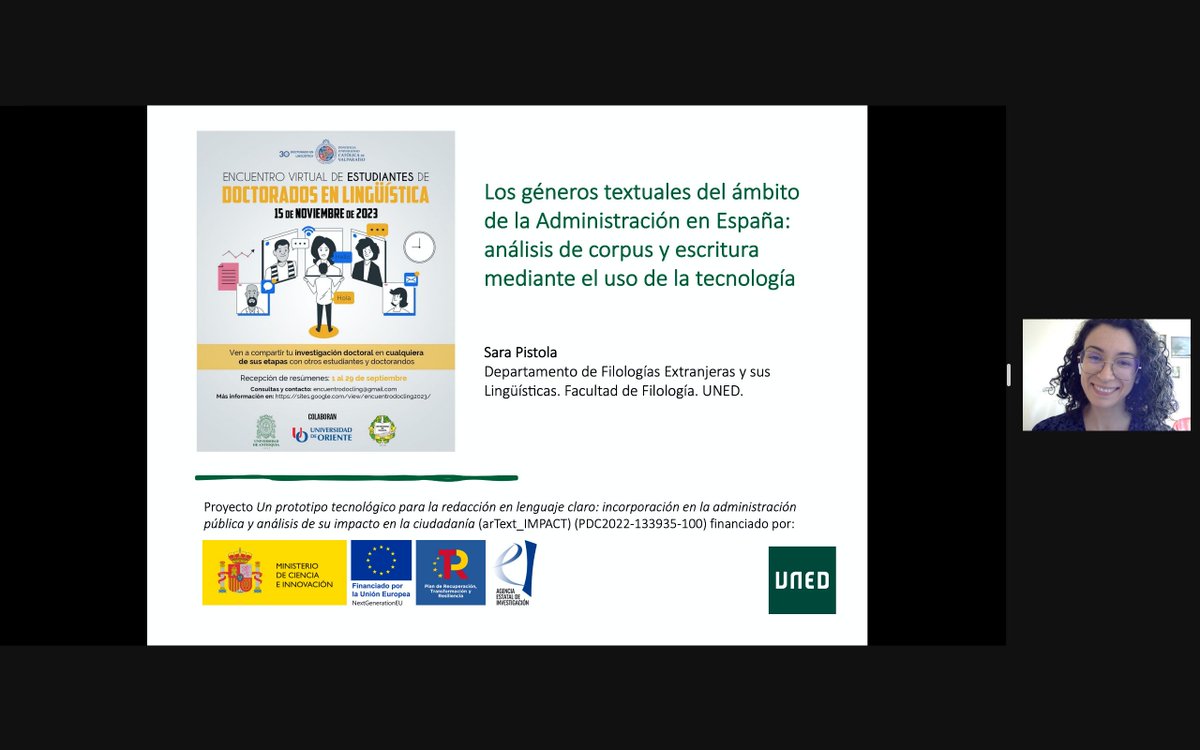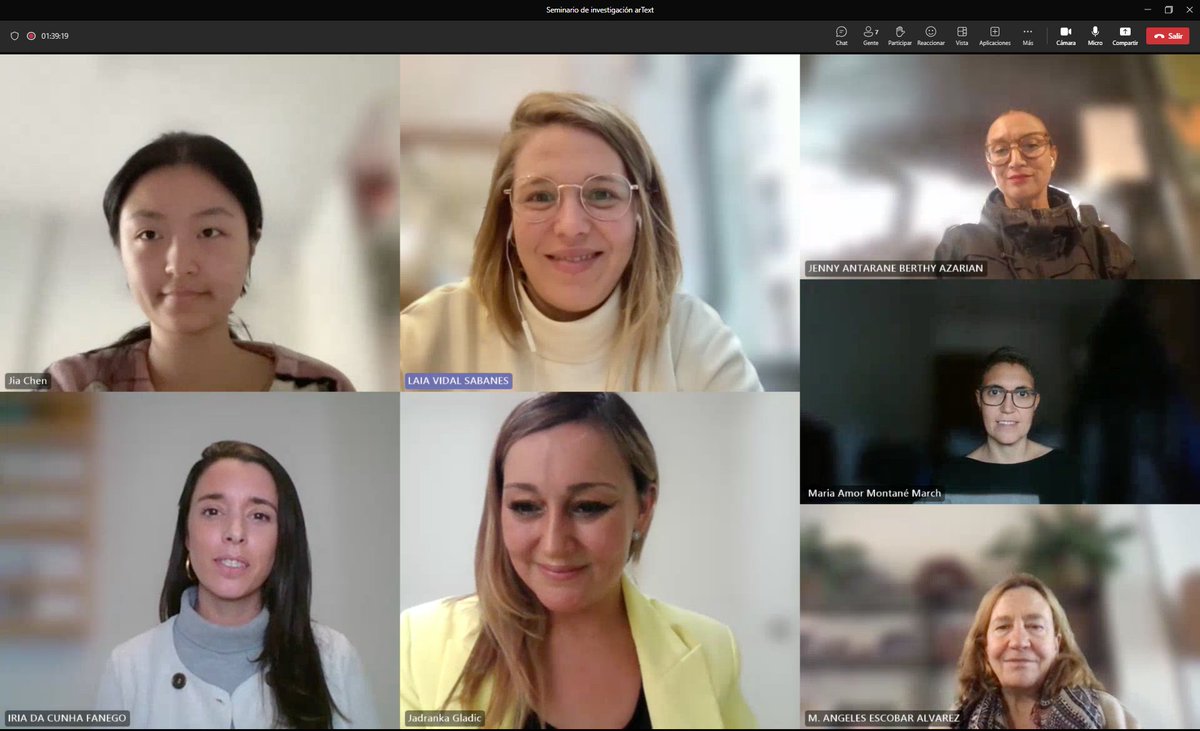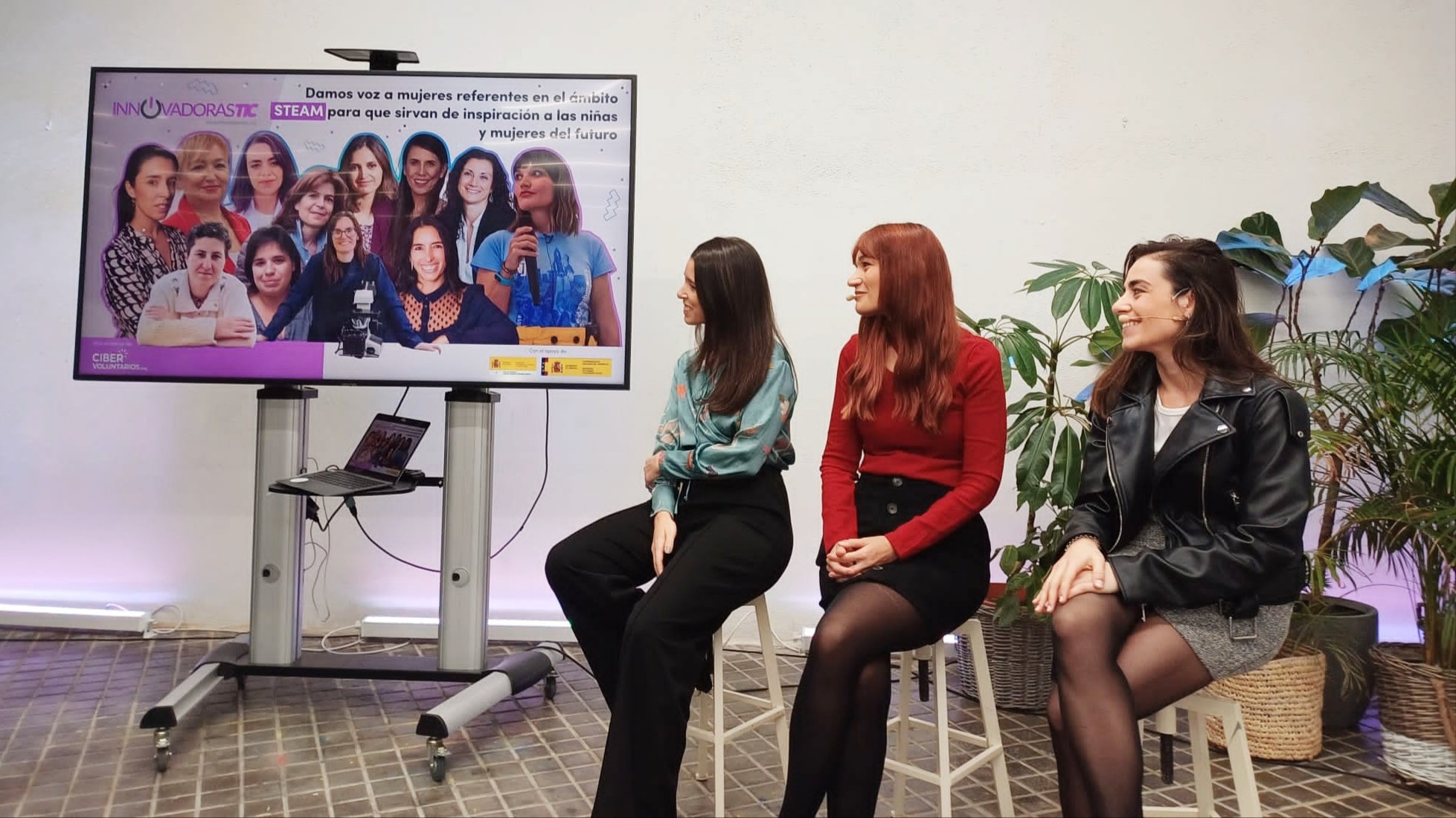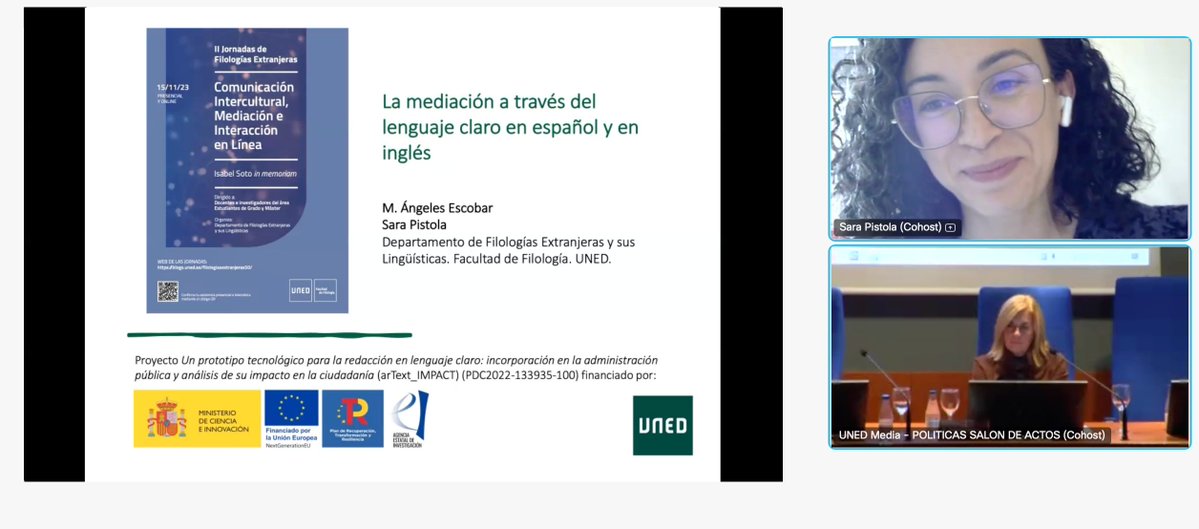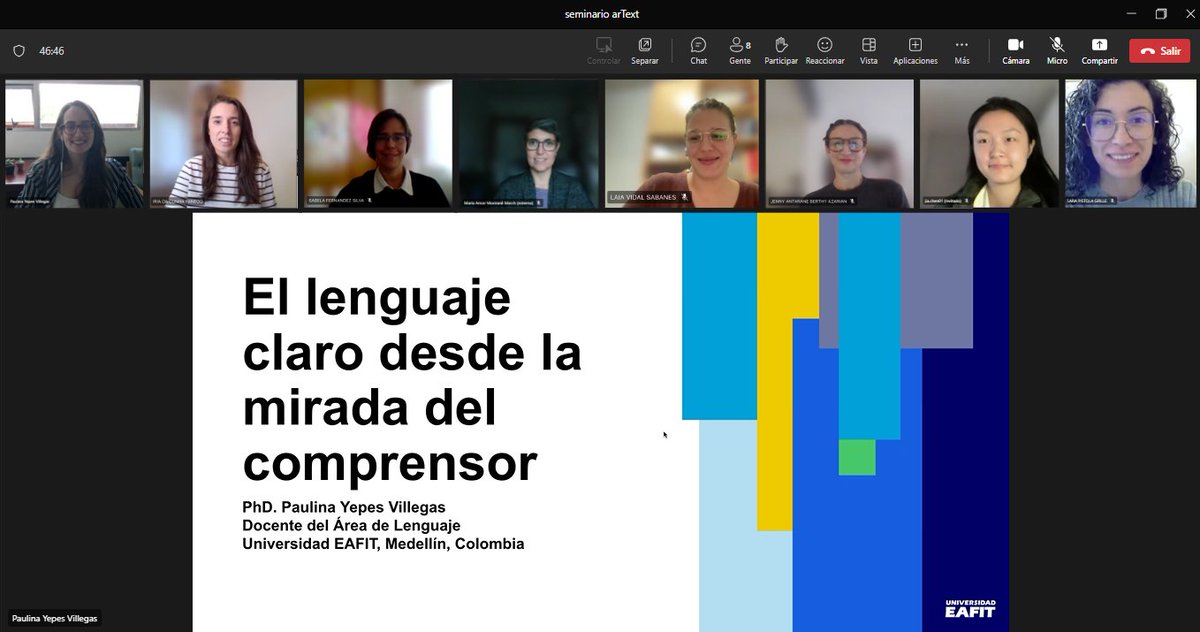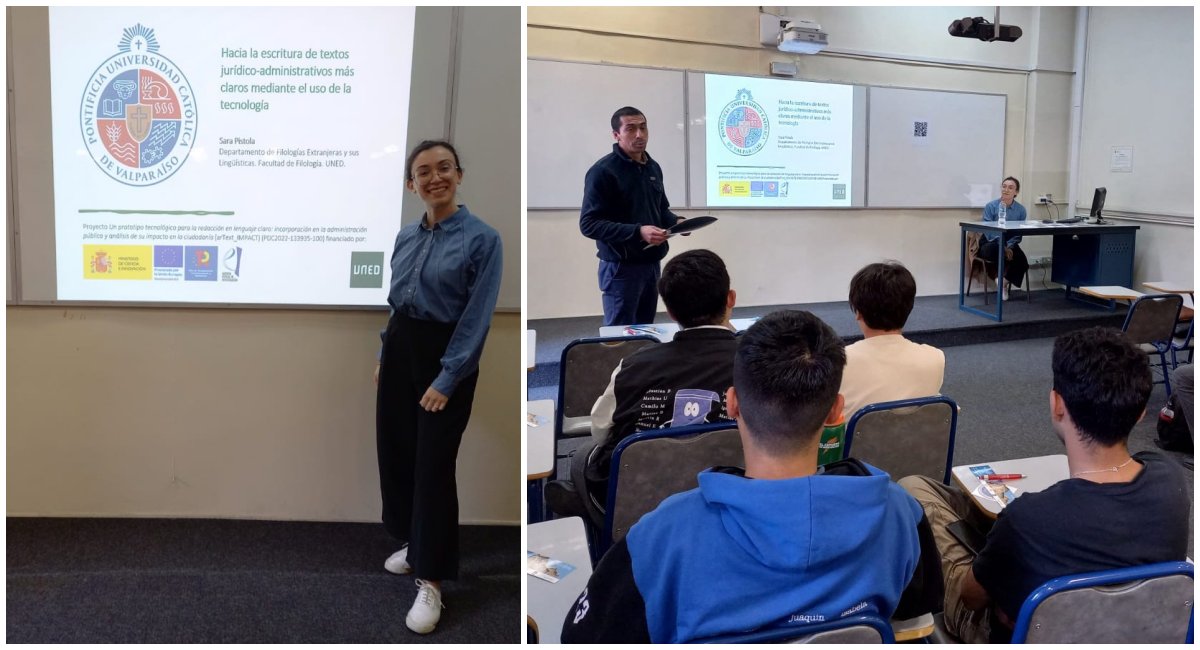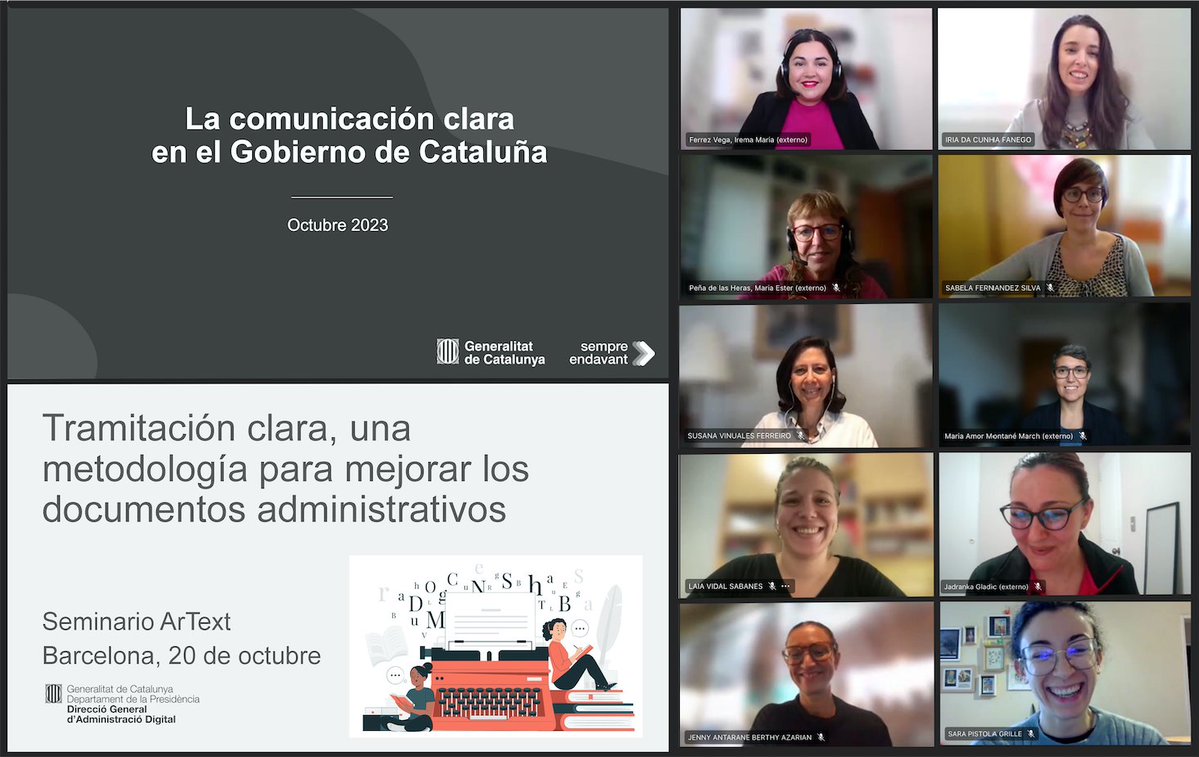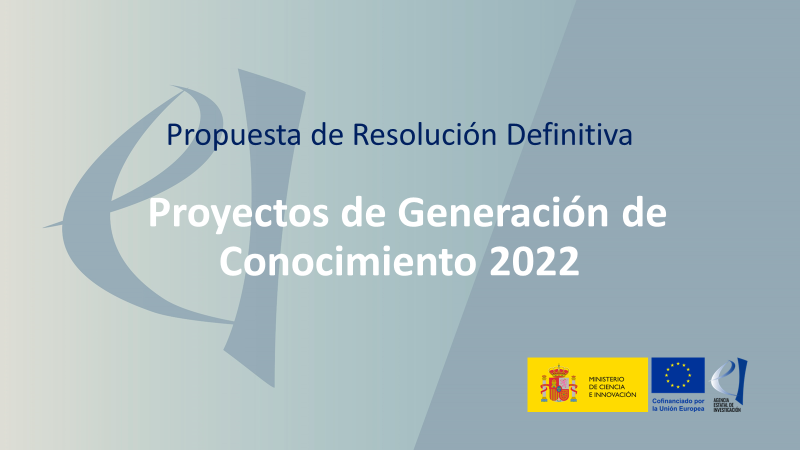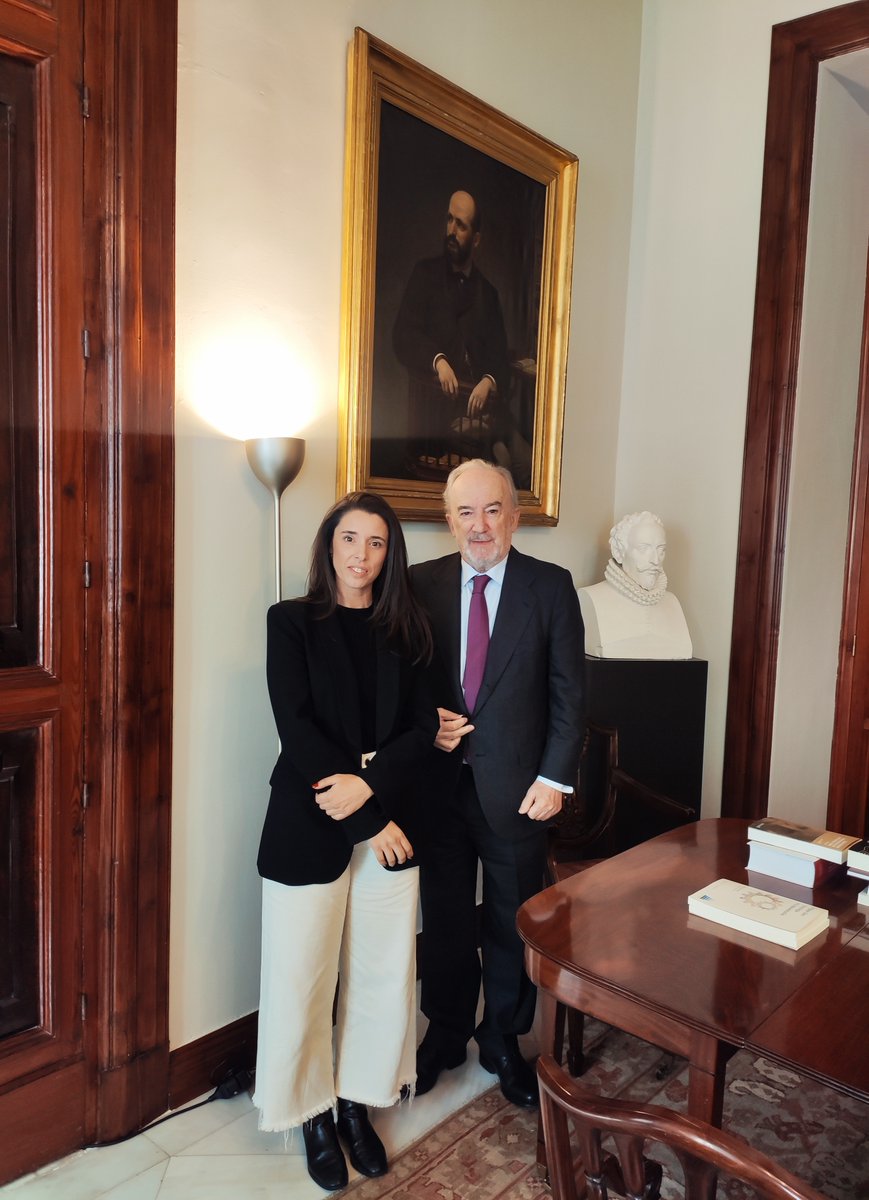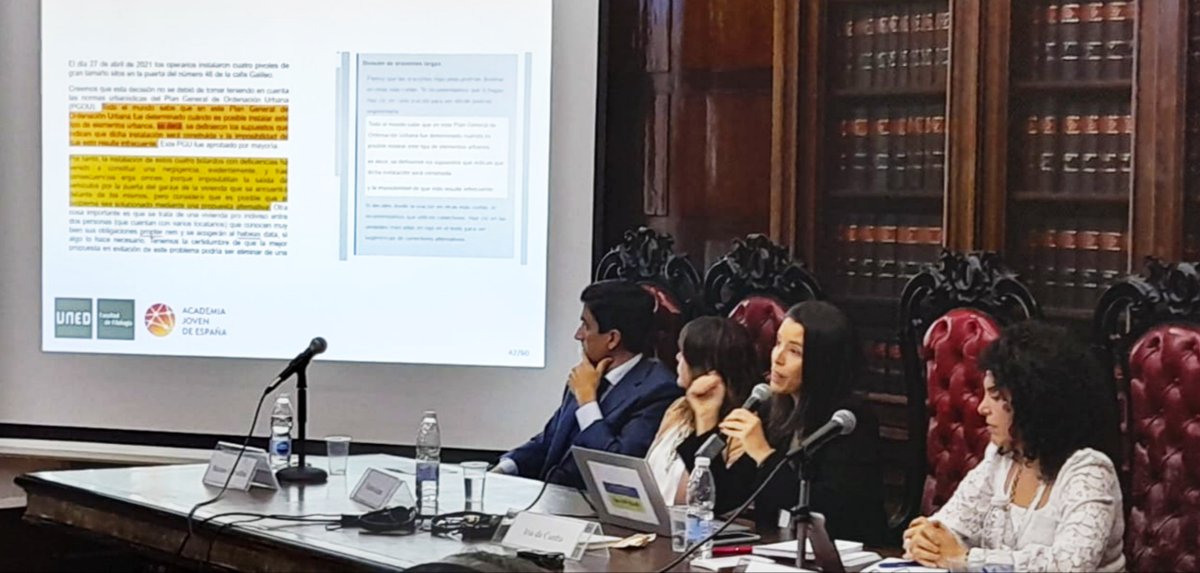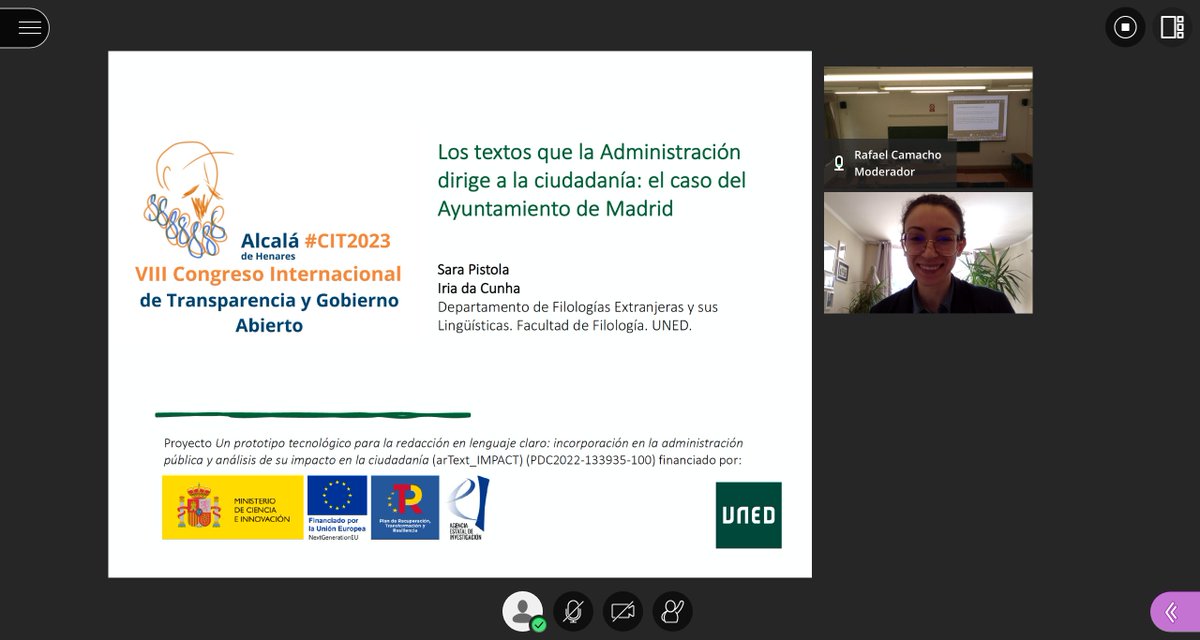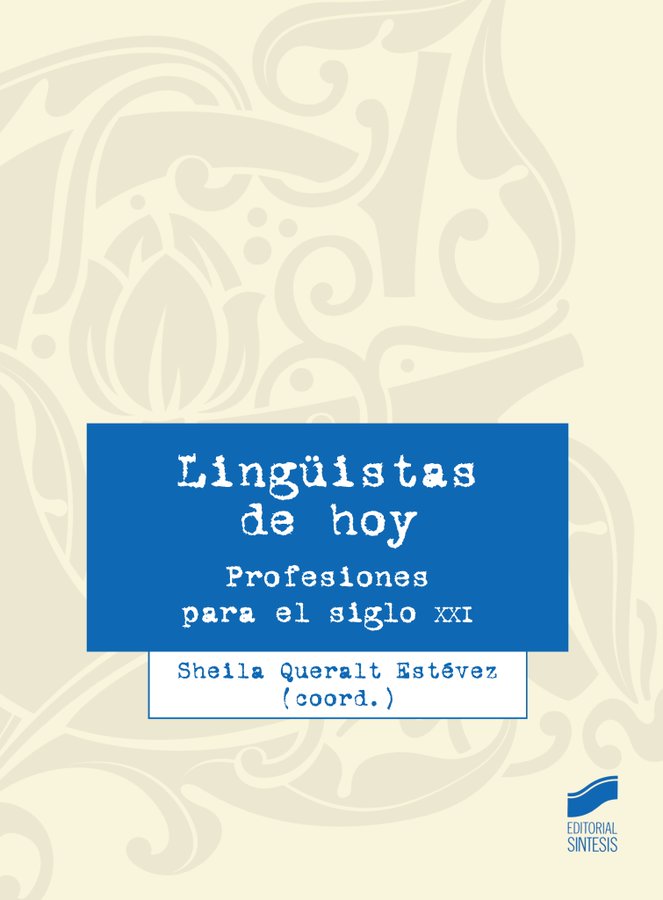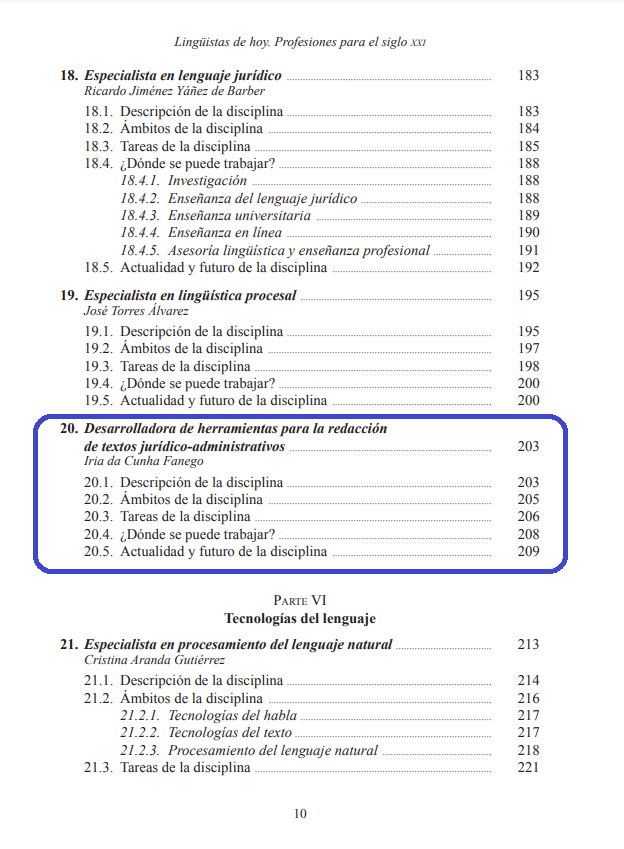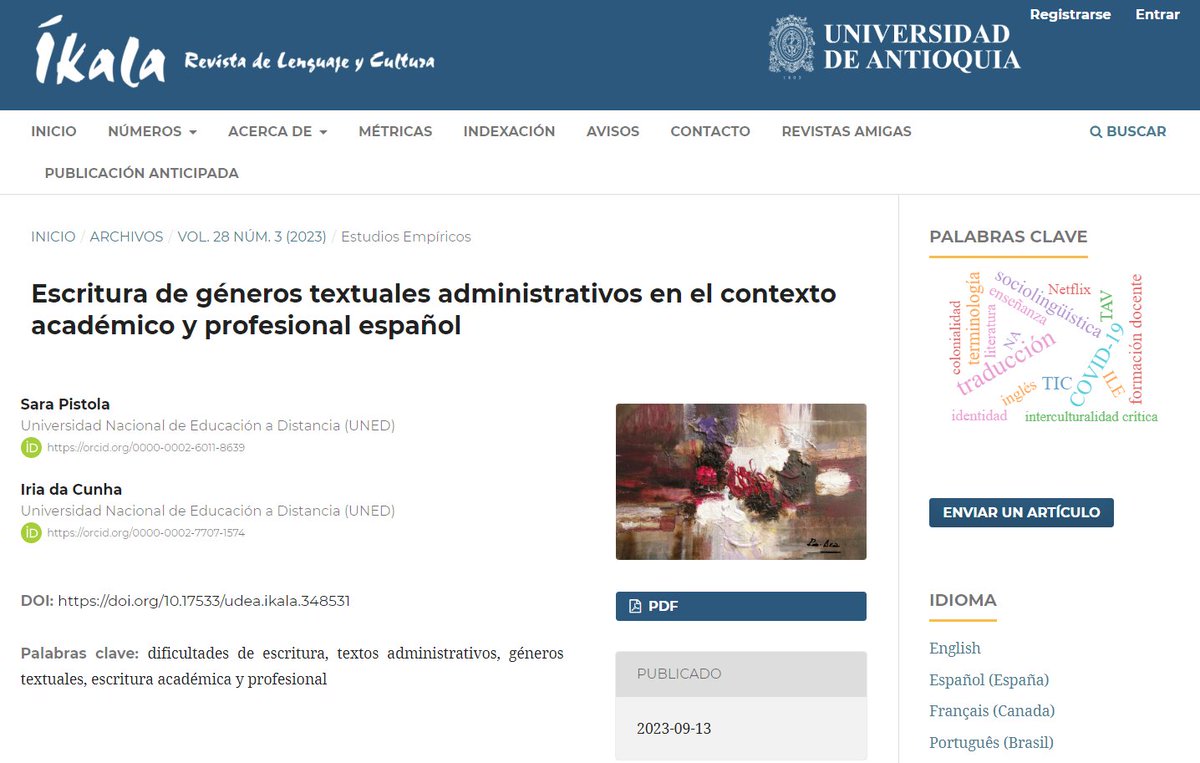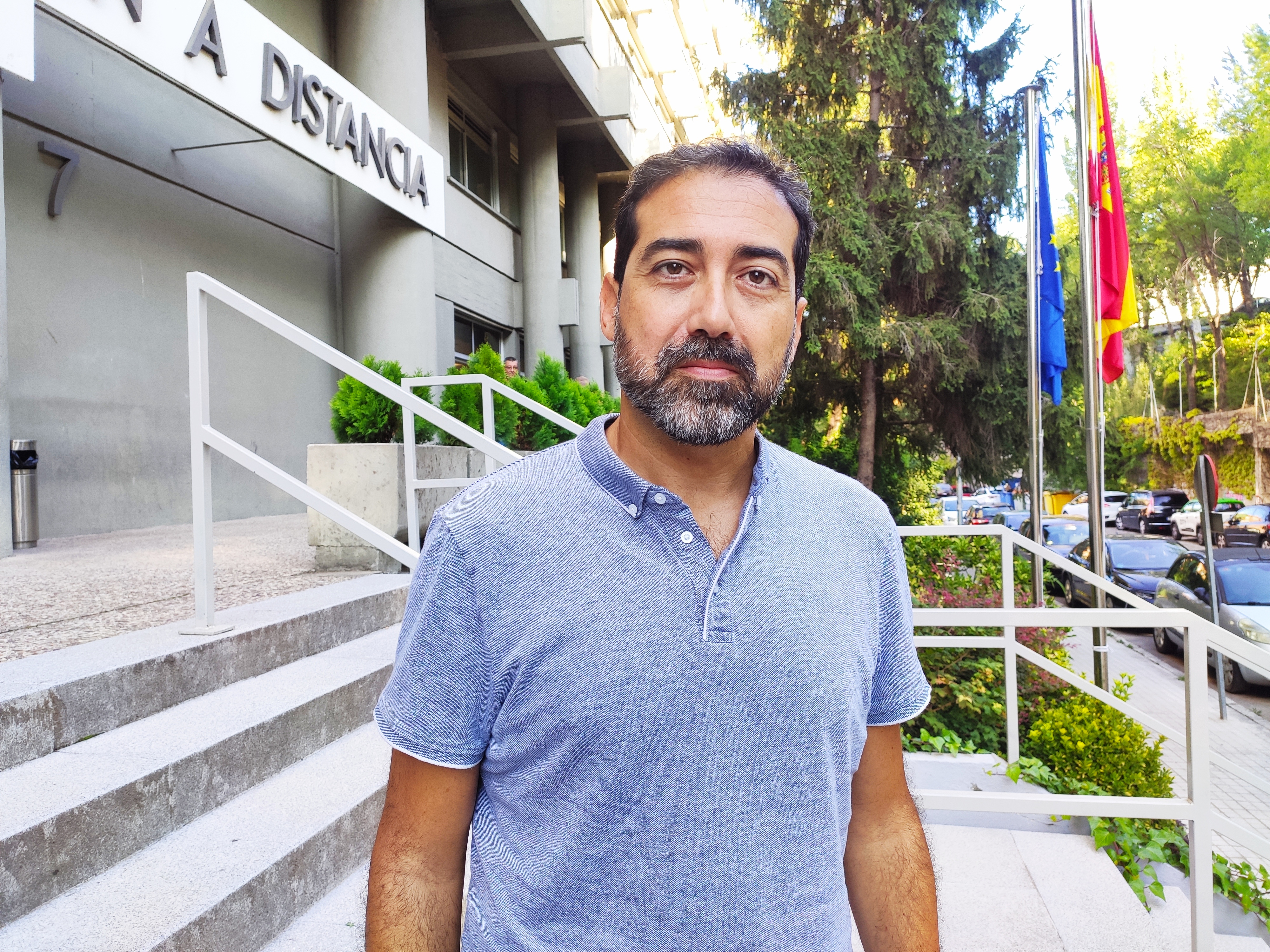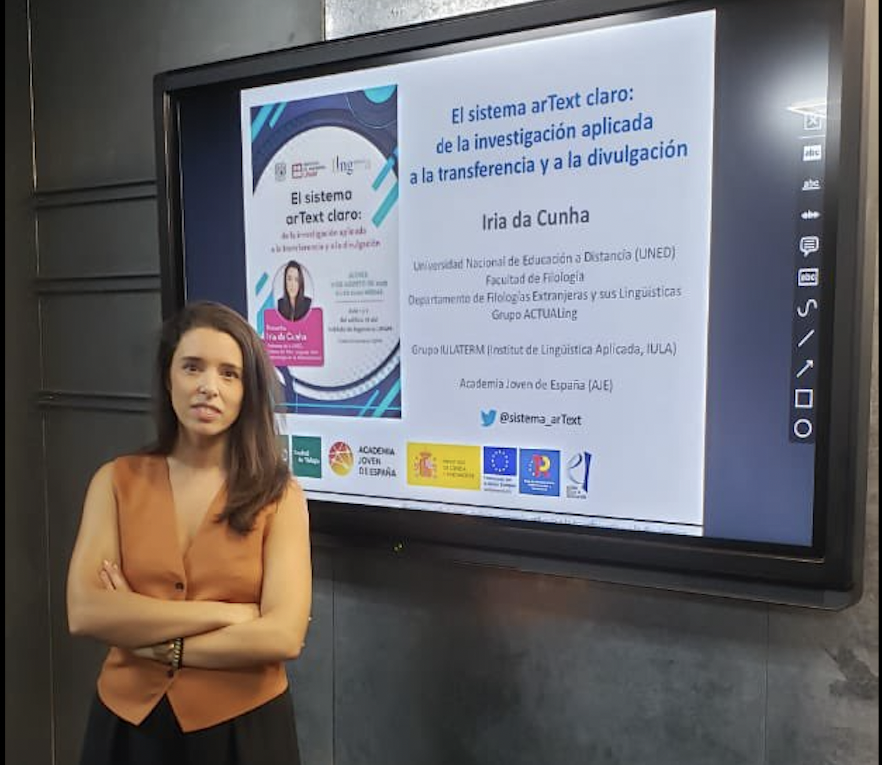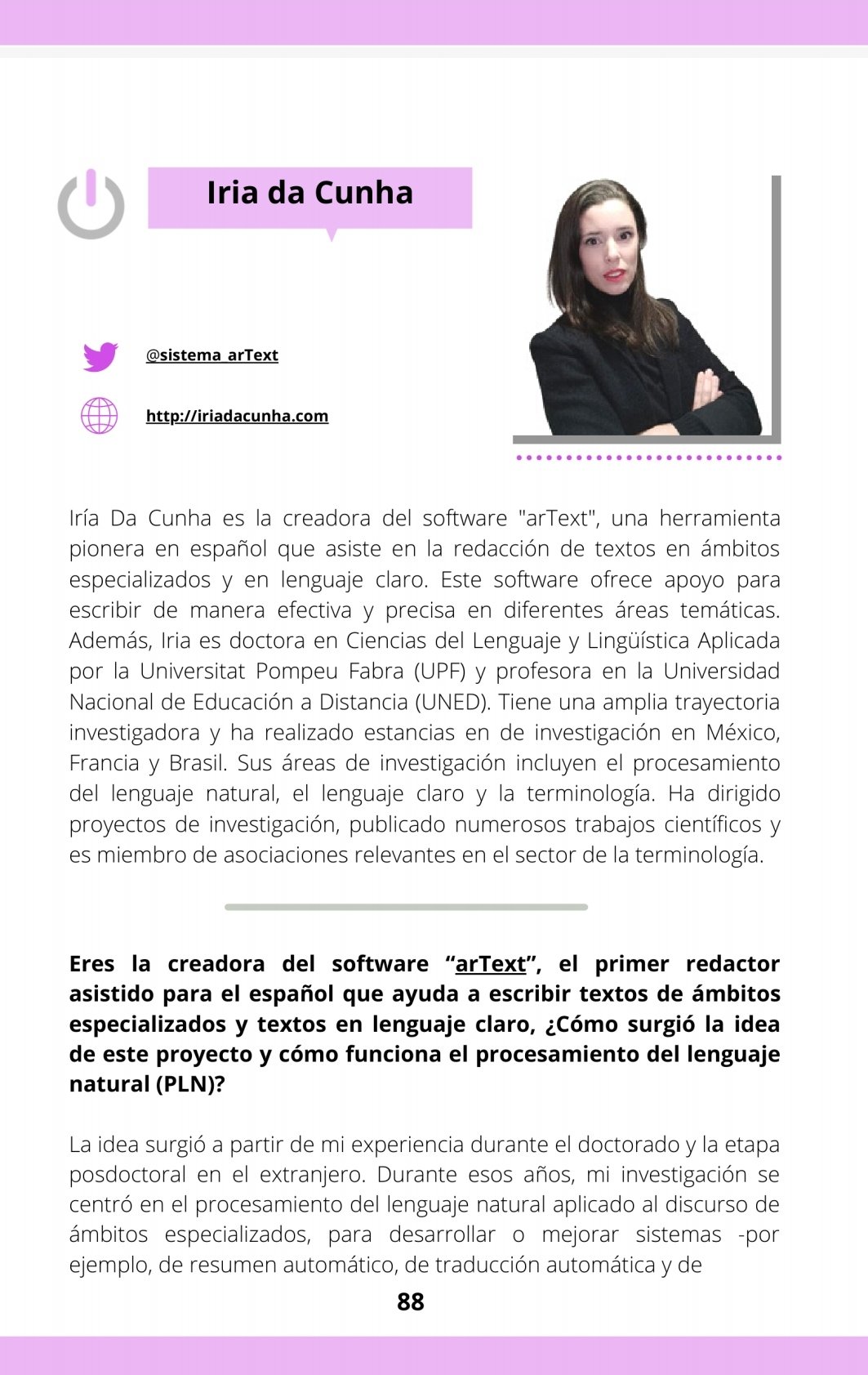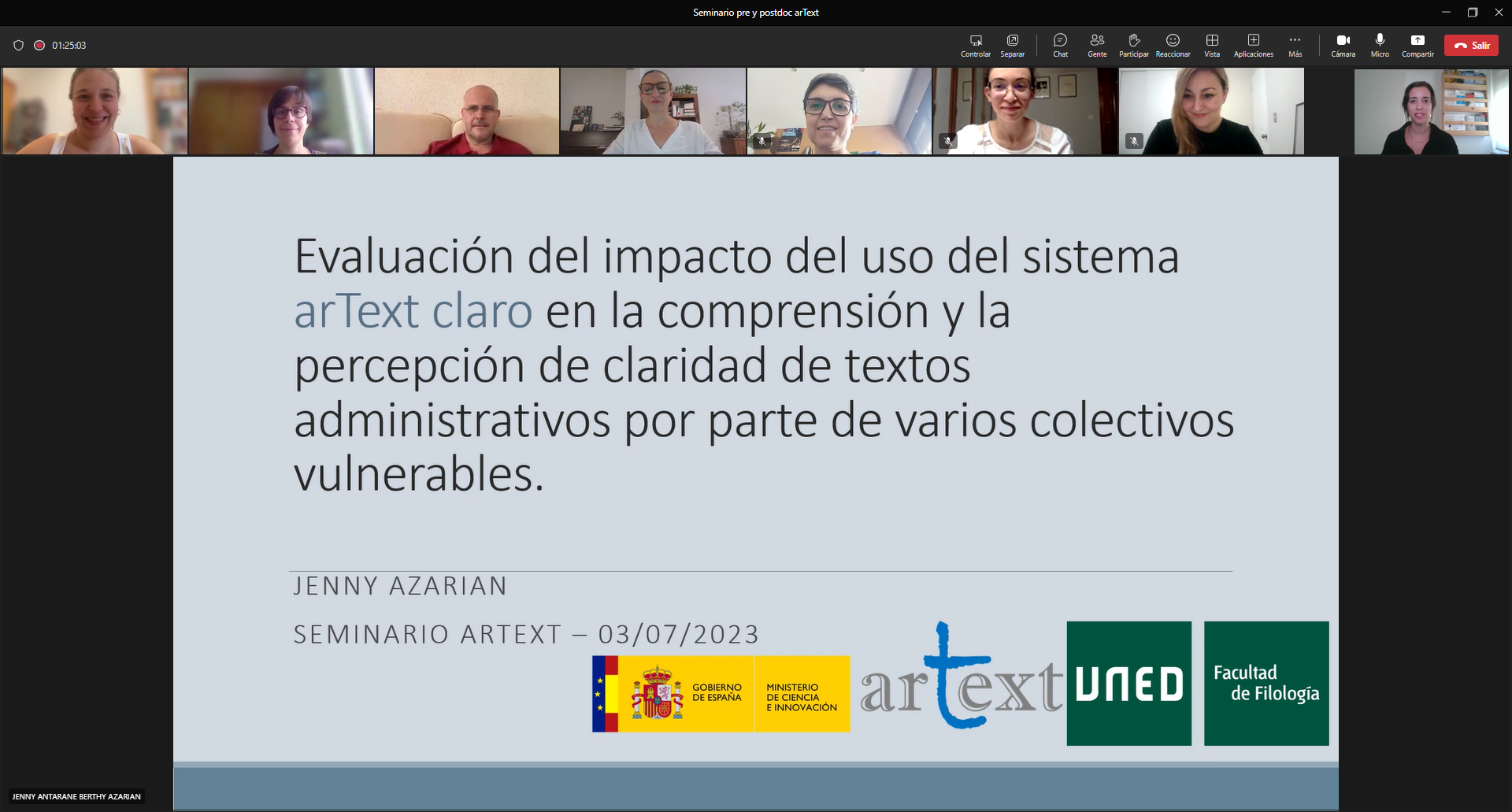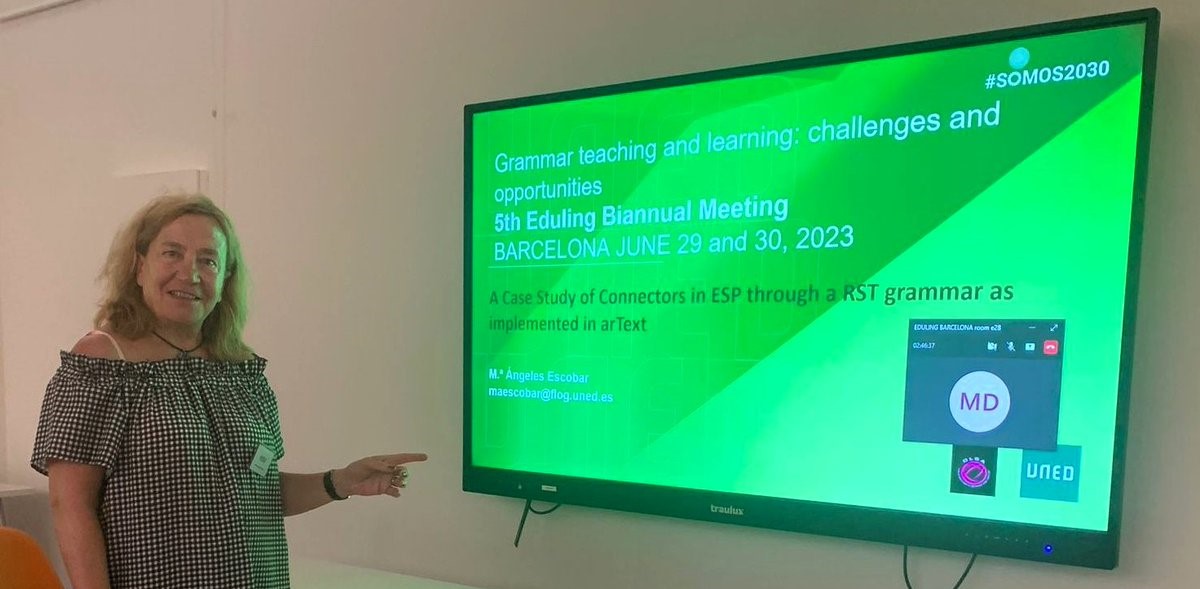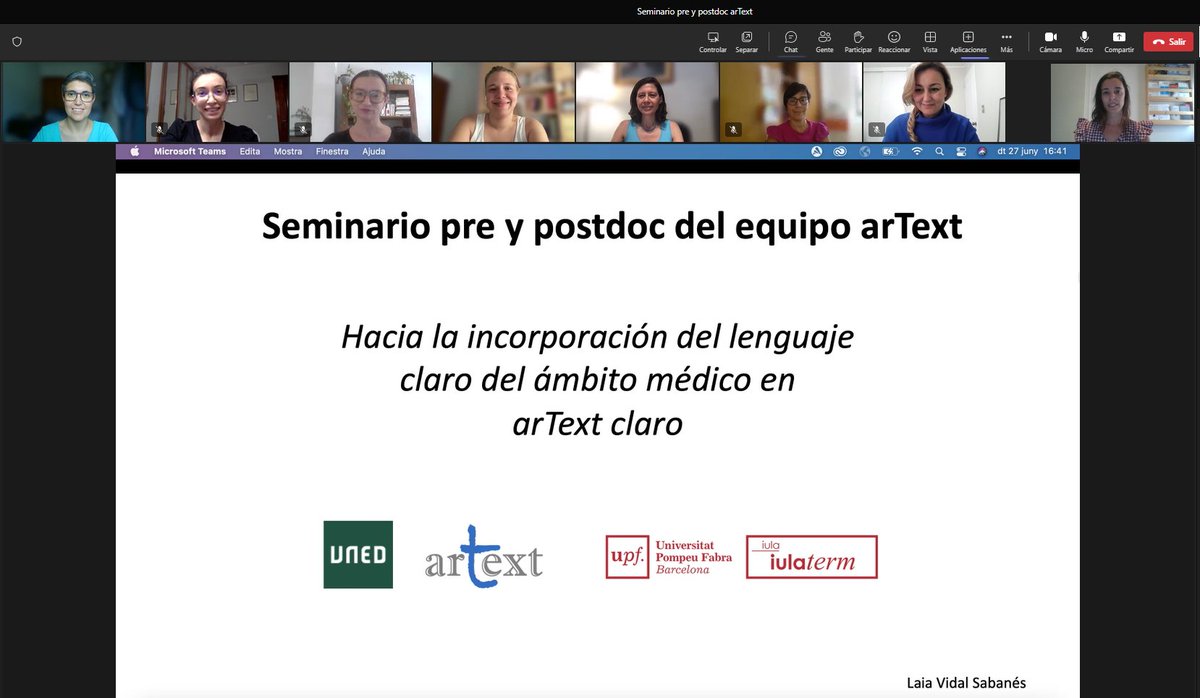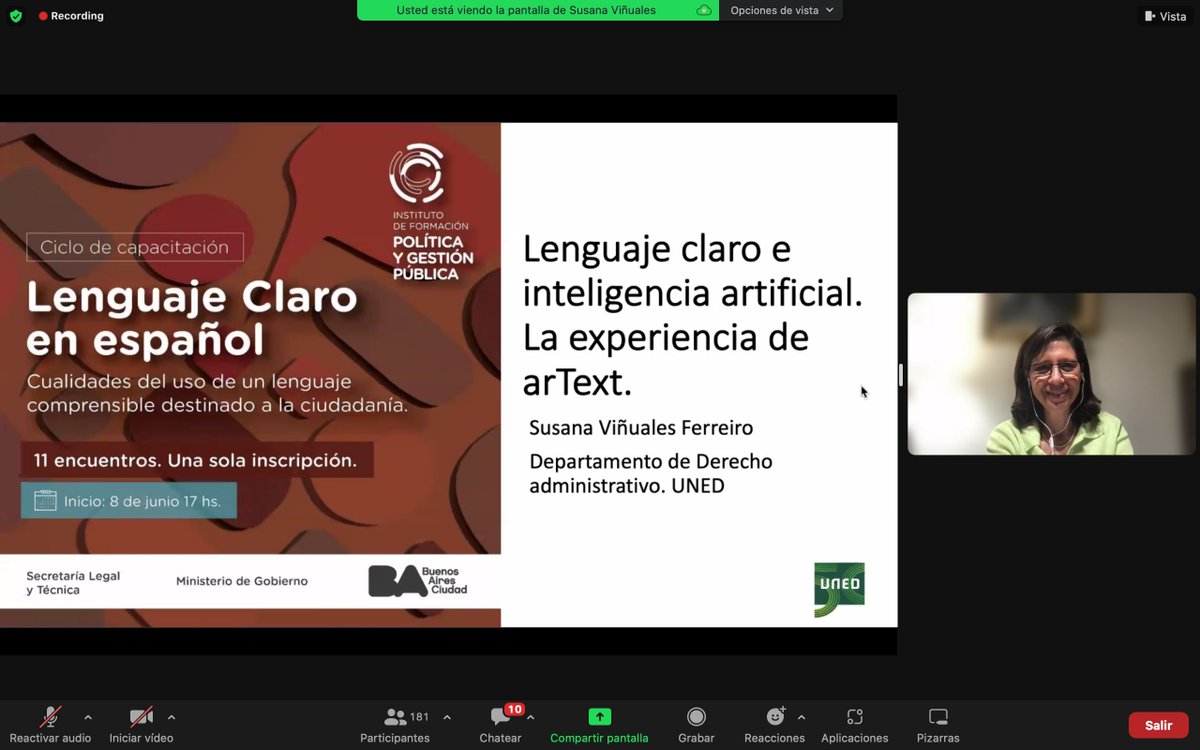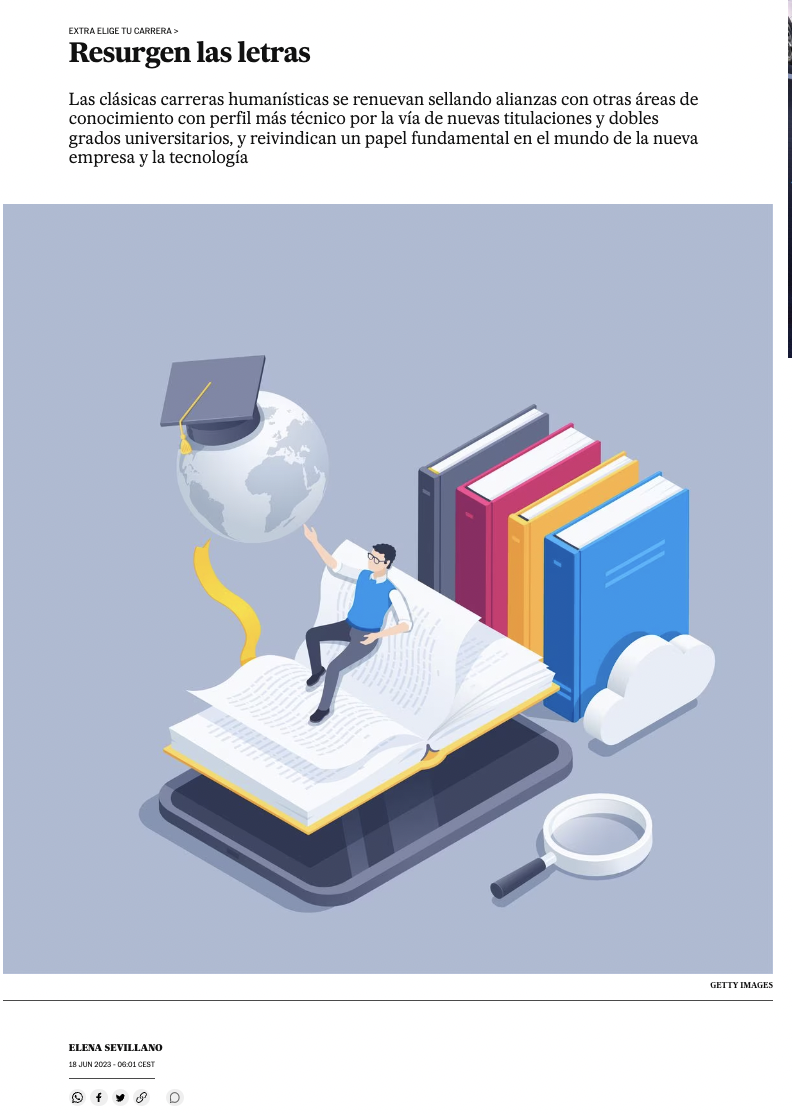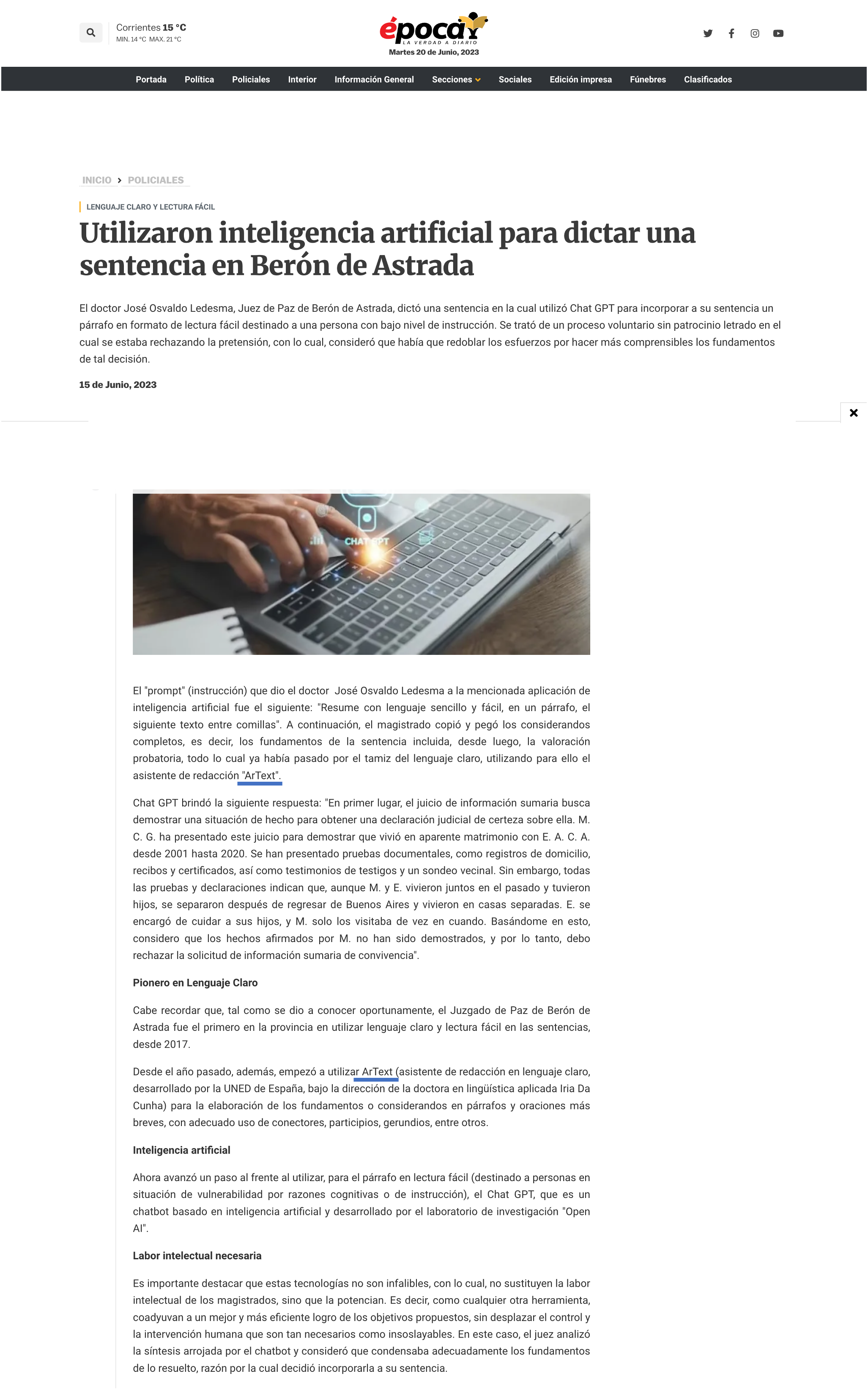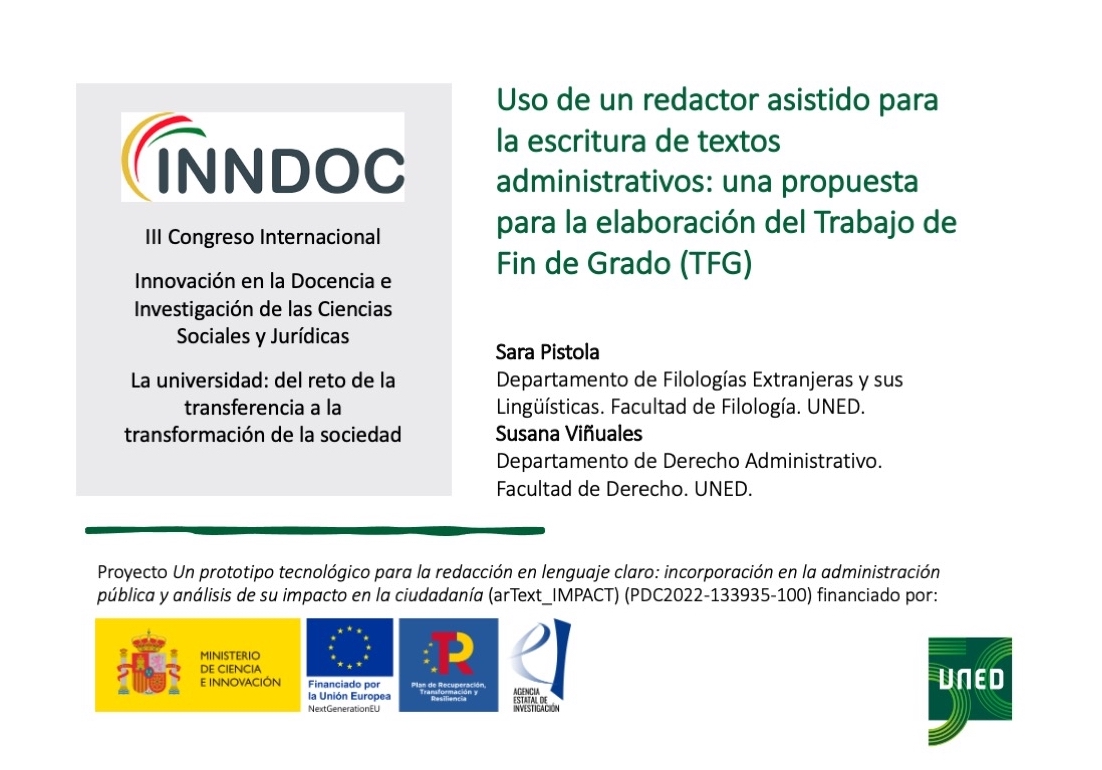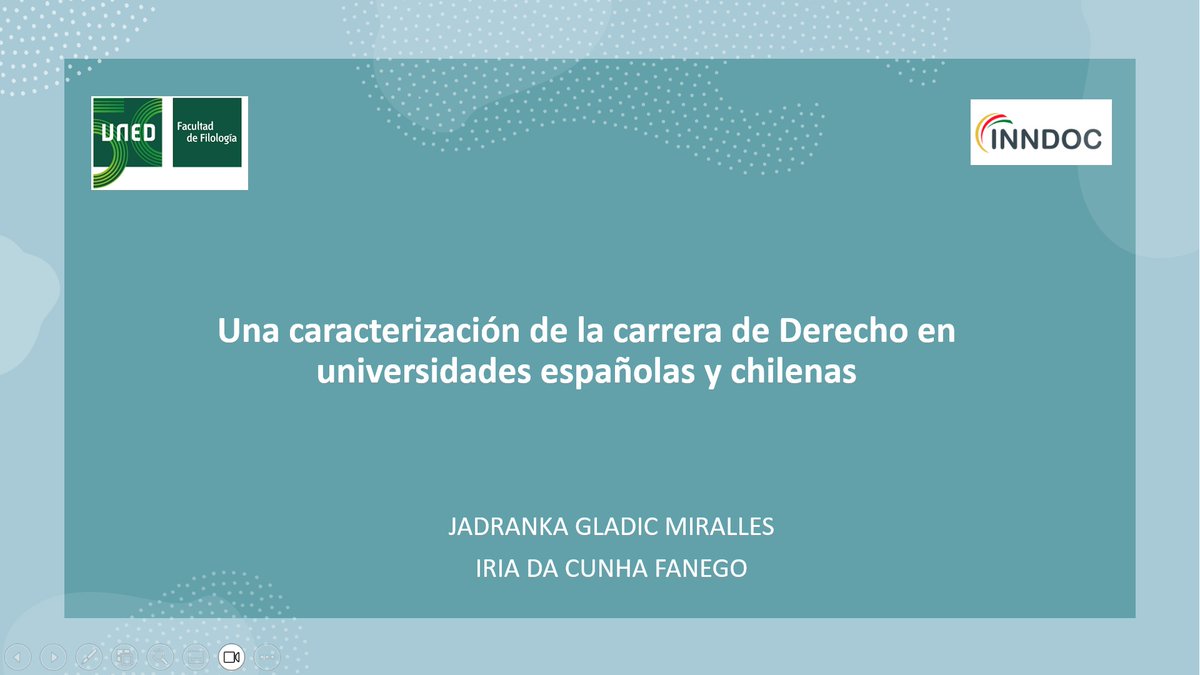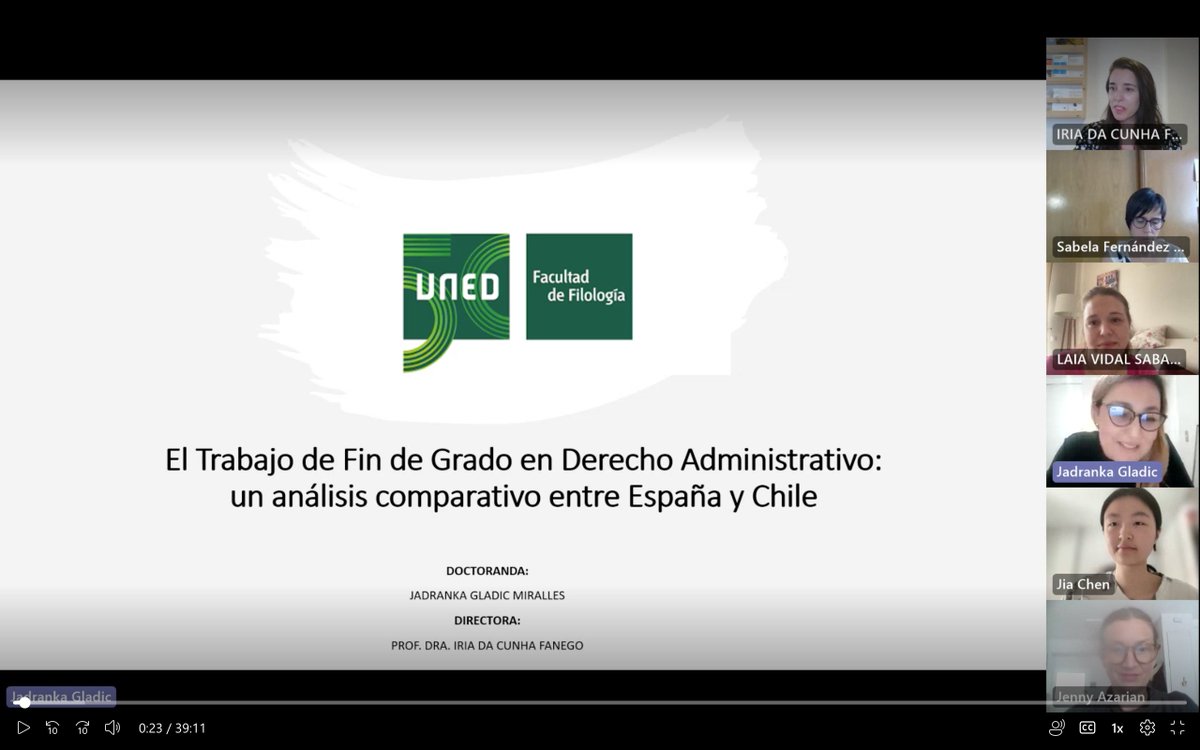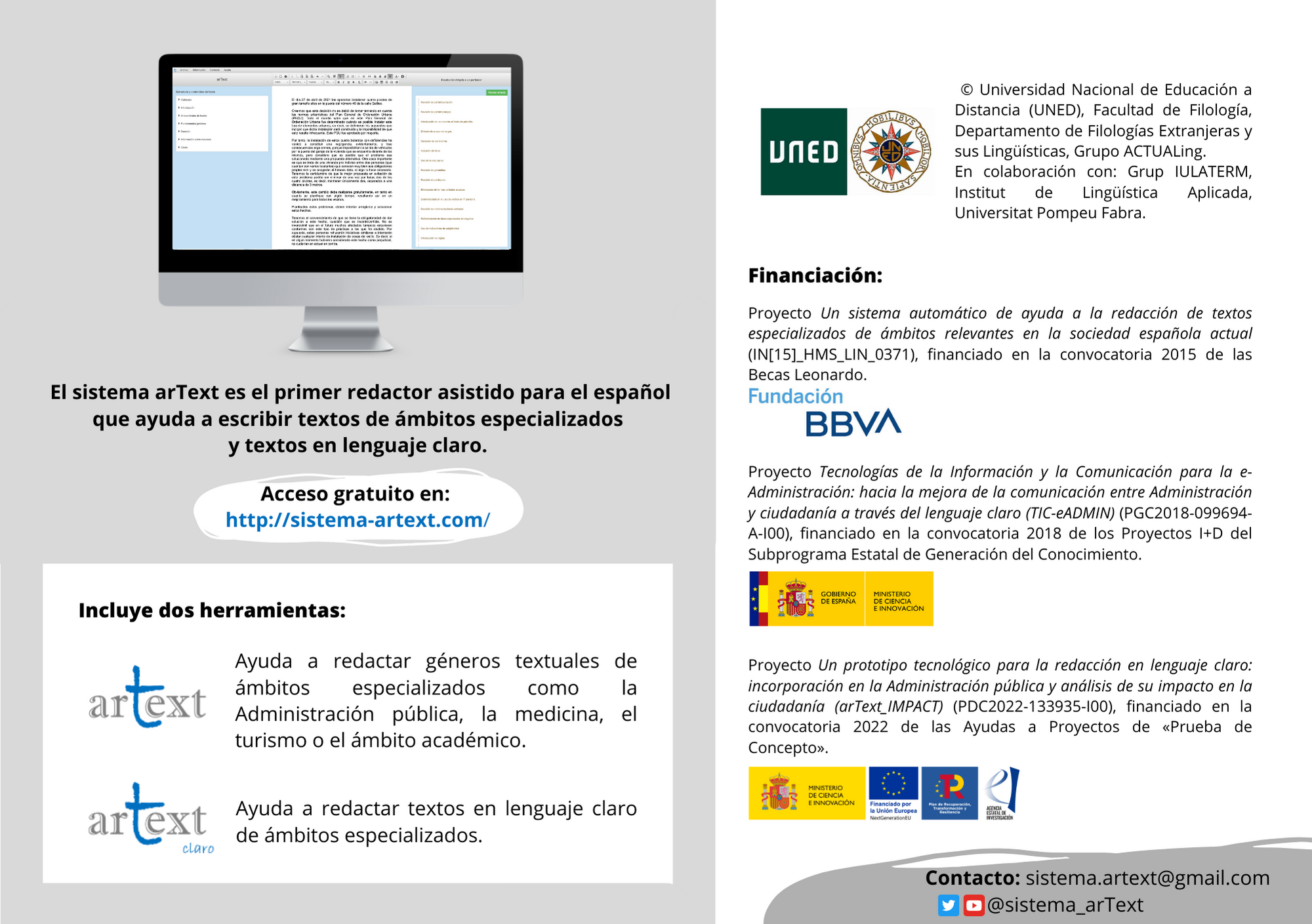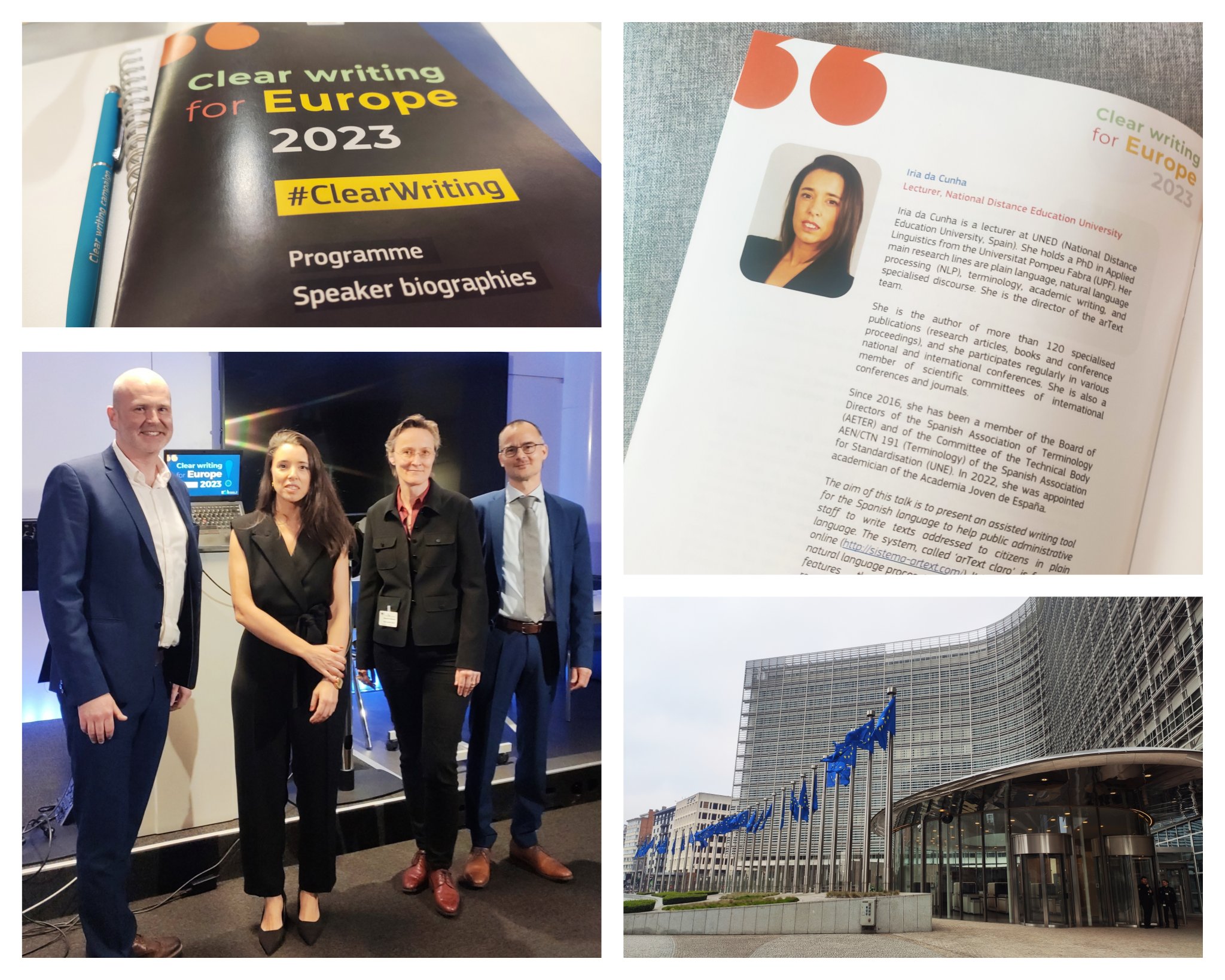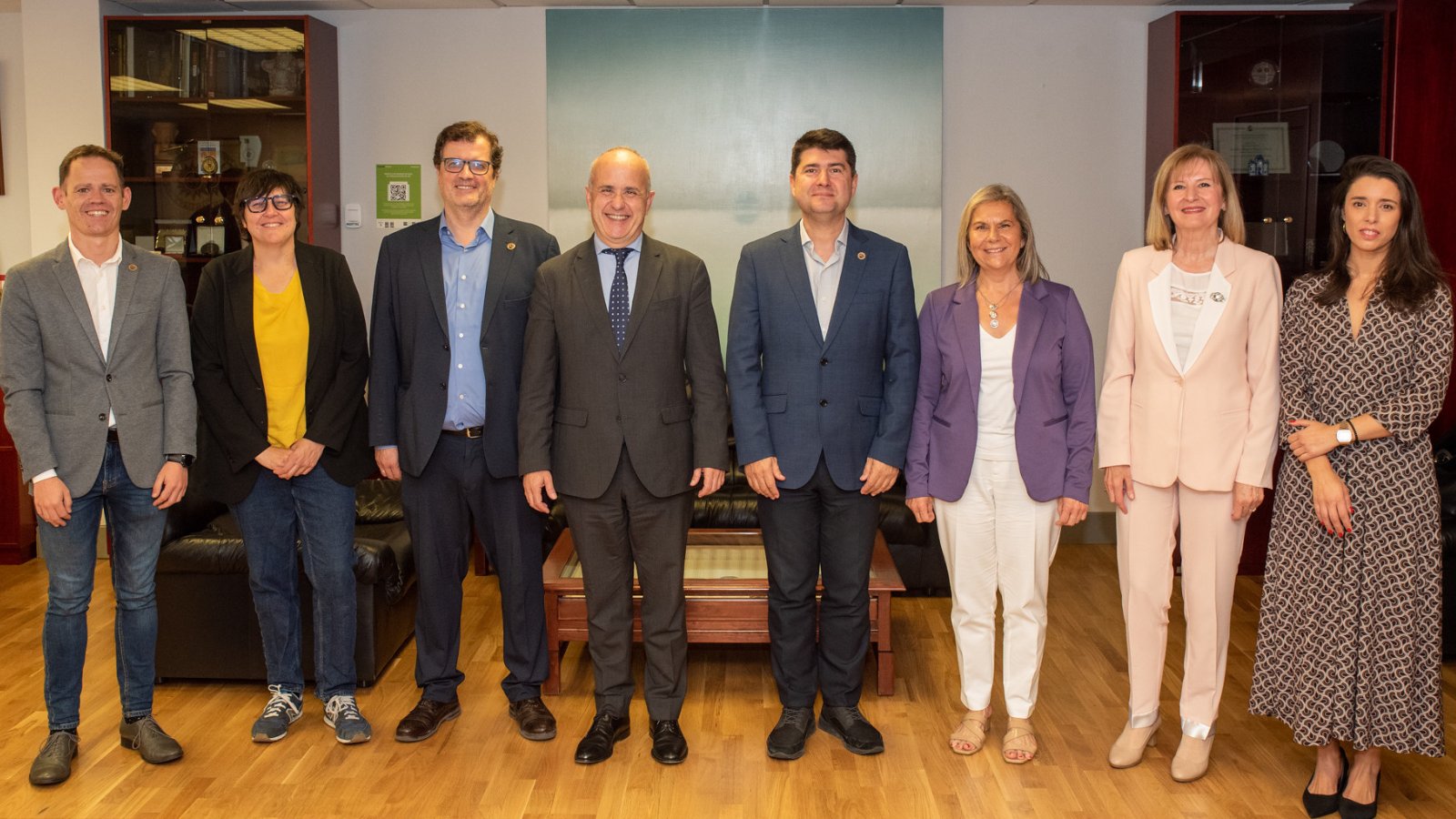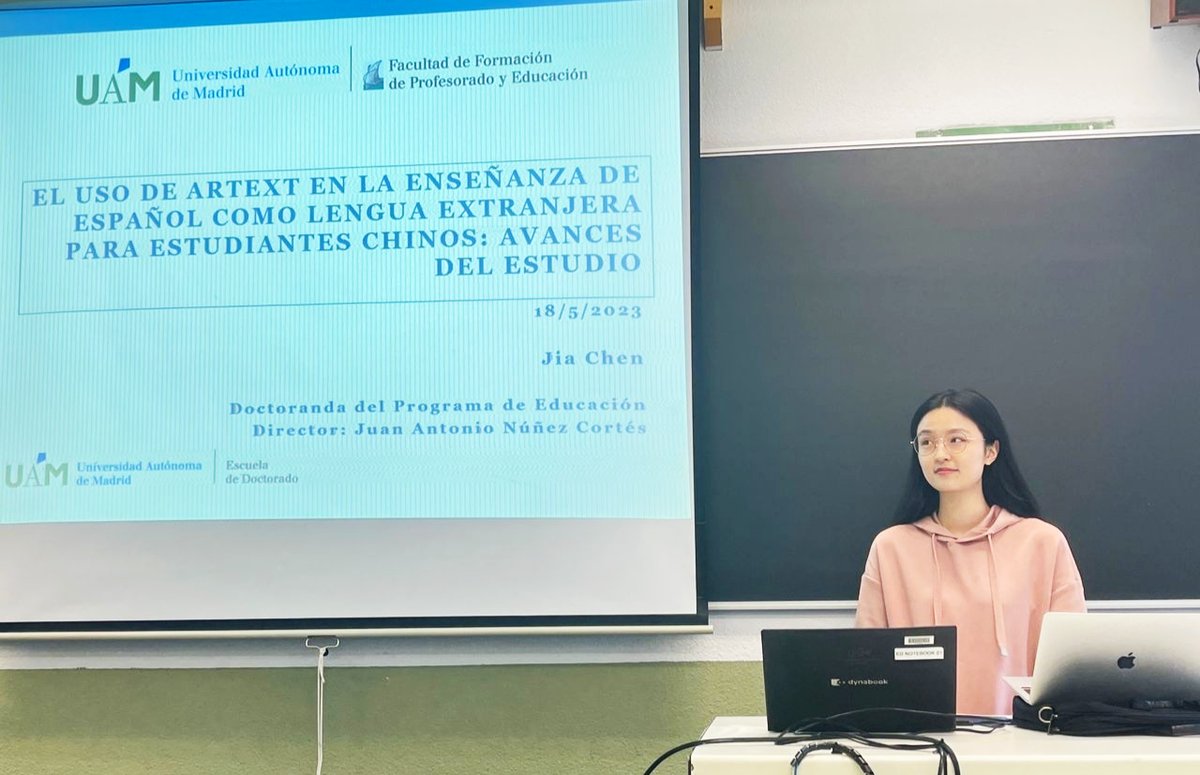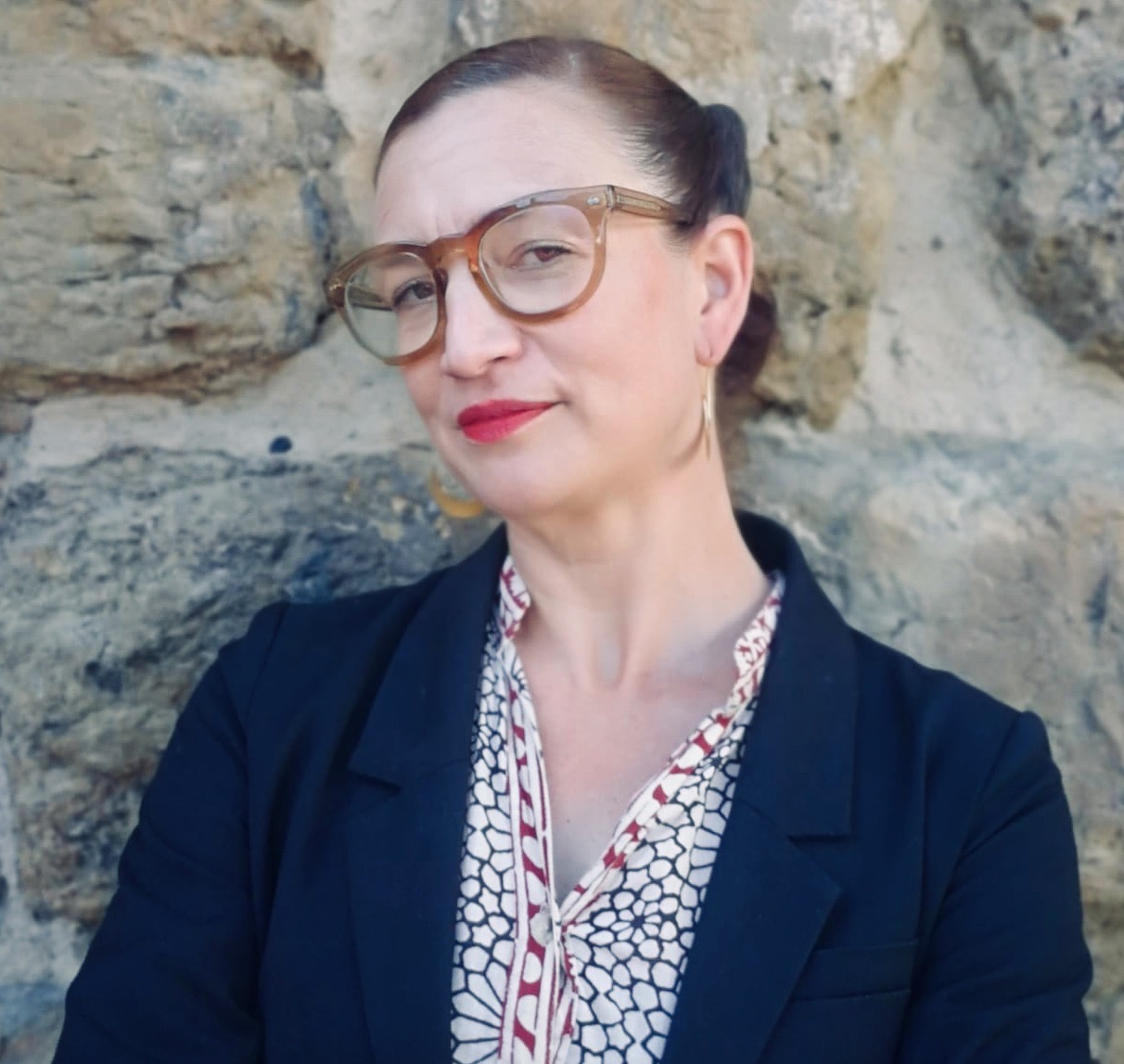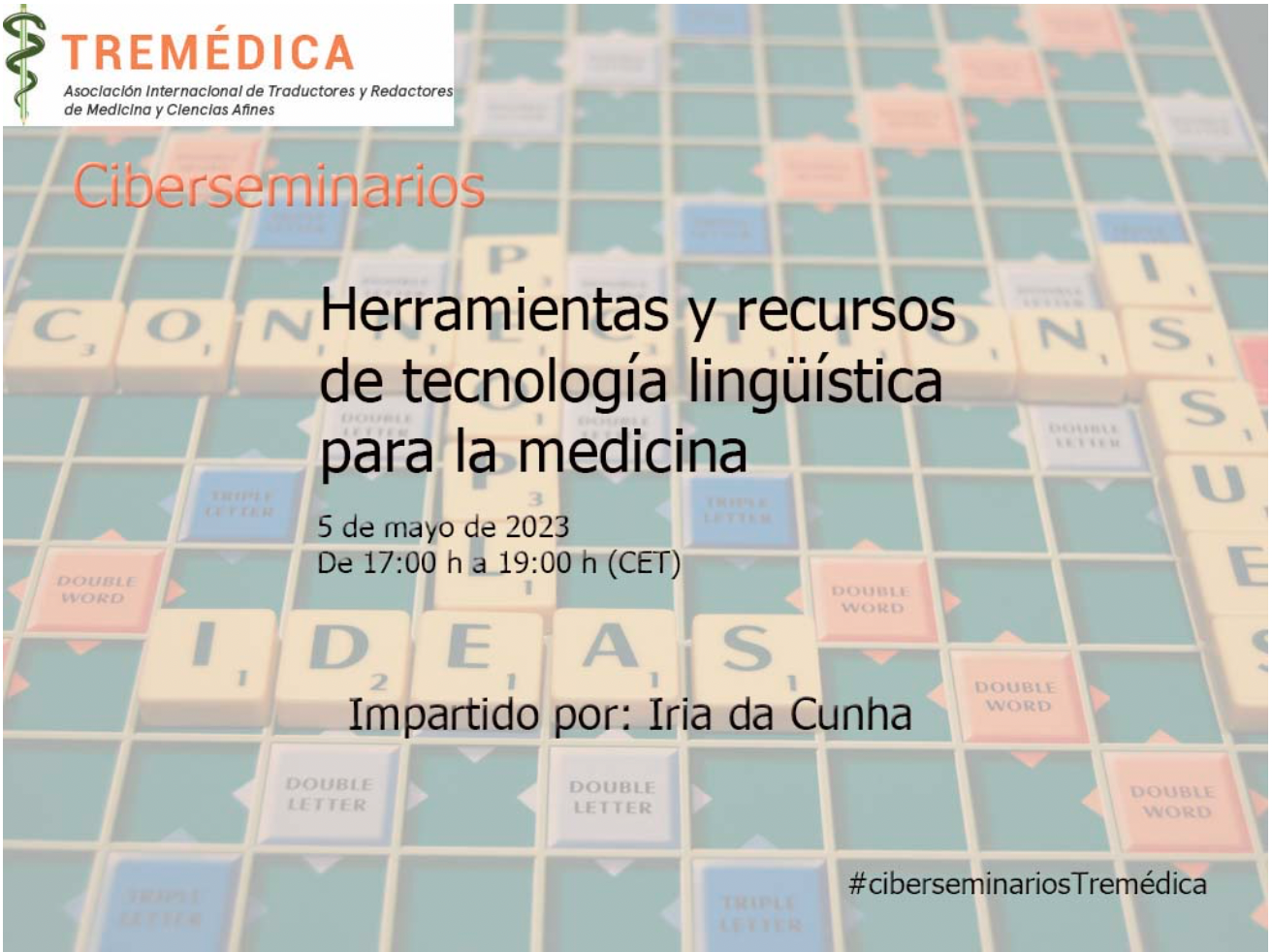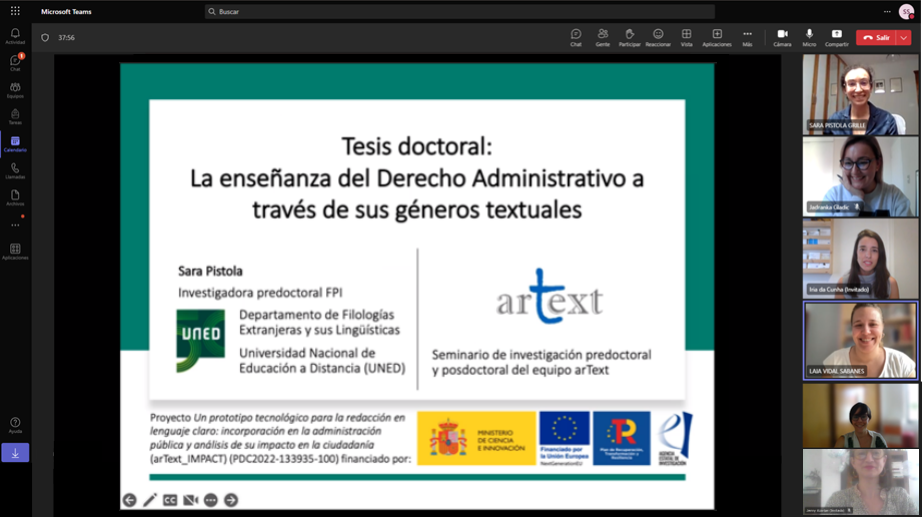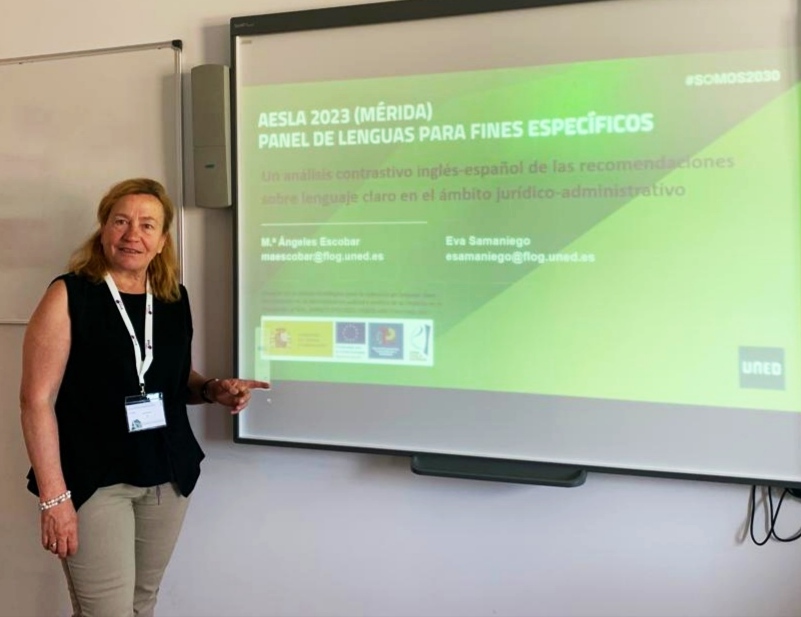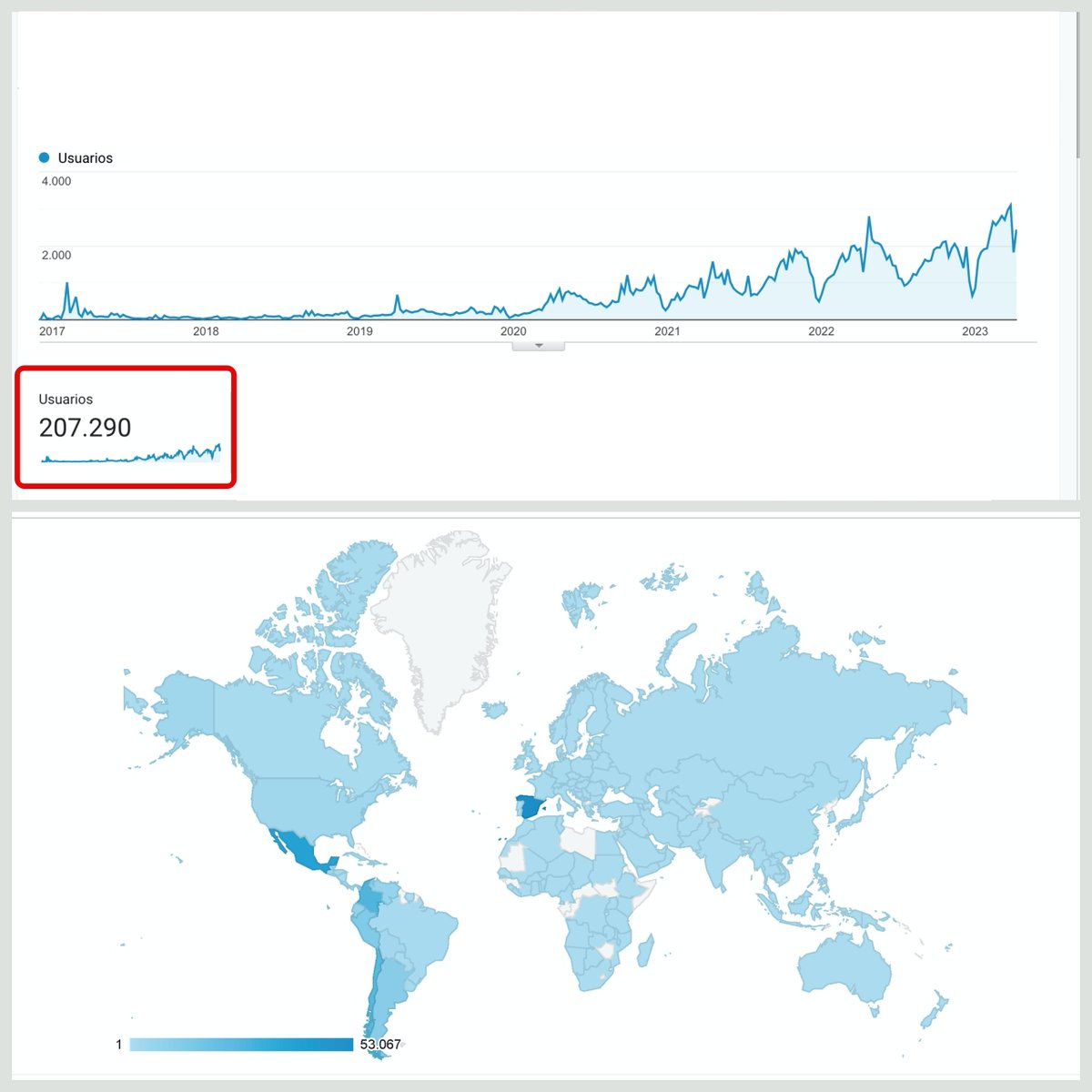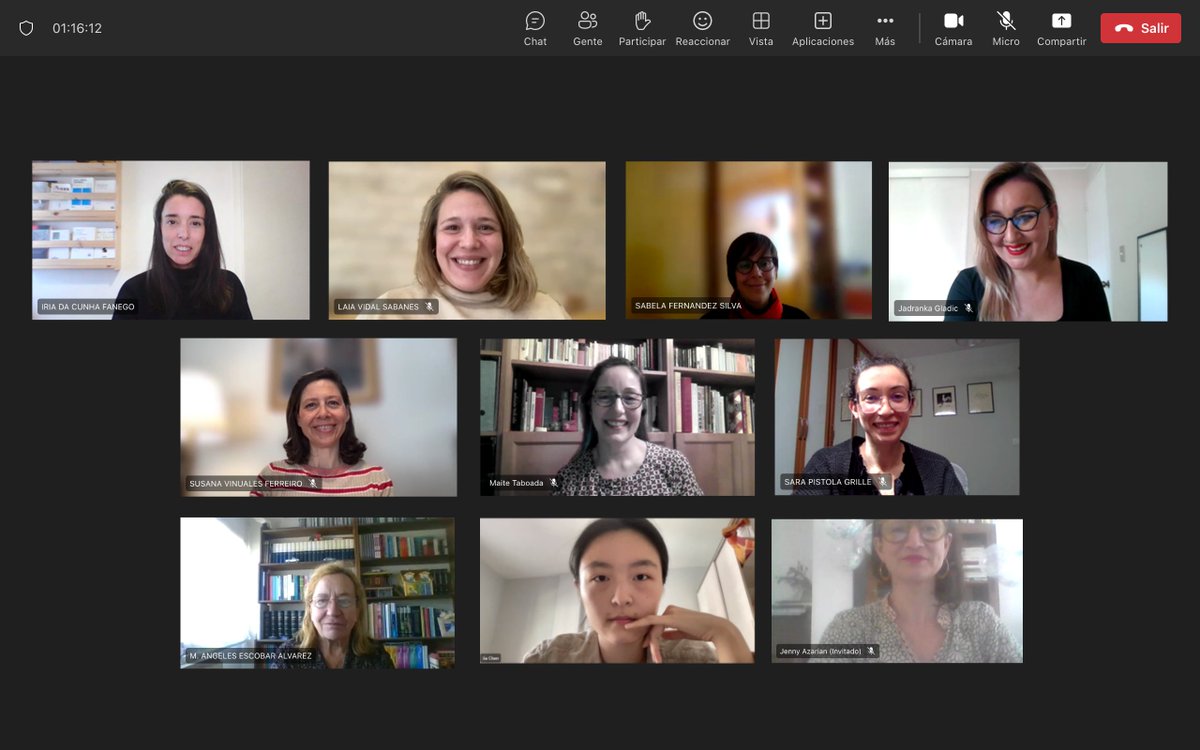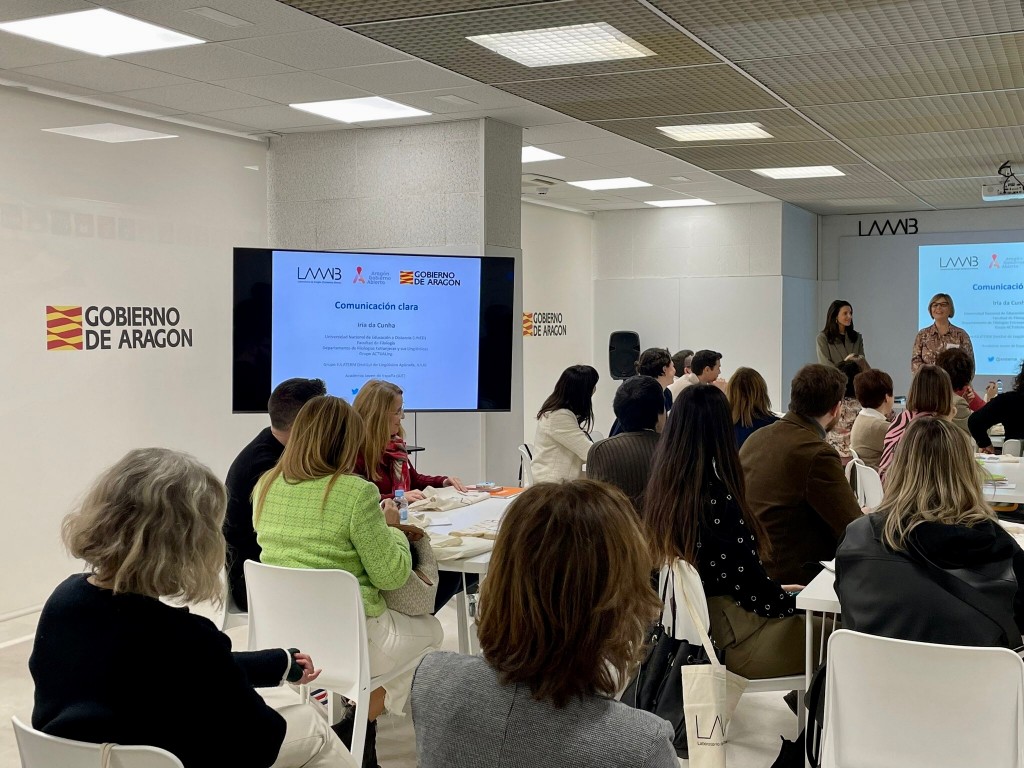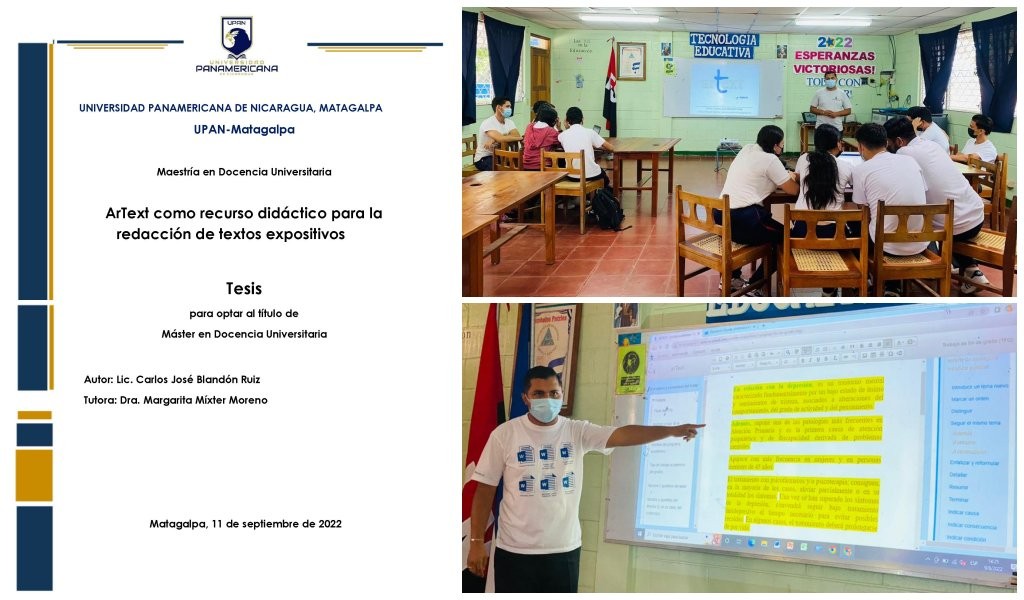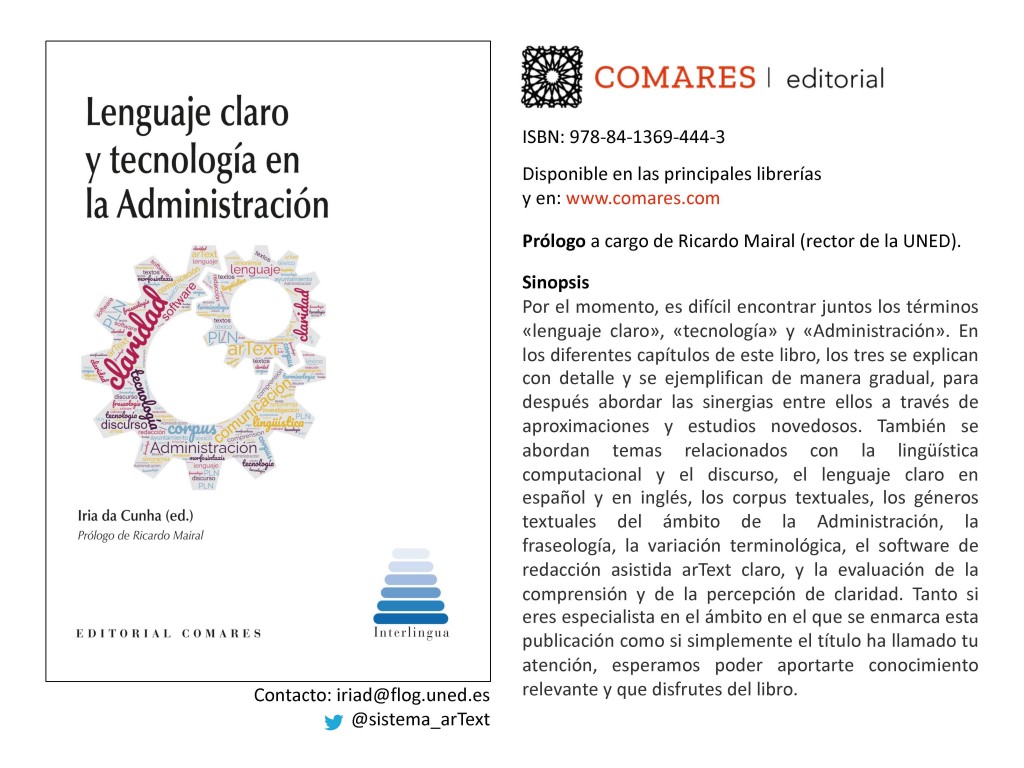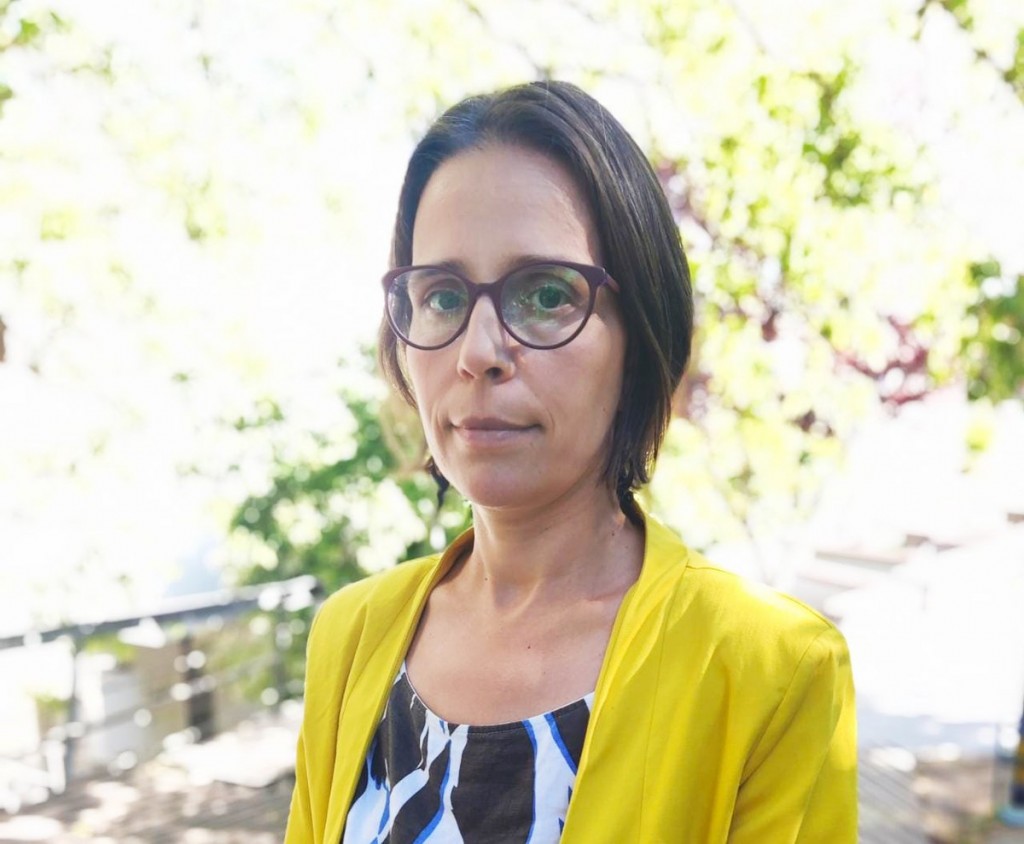Sara Pistola, FPI predoctoral researcher at the Departamento de Filologías Extranjeras y sus Lingüísticas de la UNED, presented “Los géneros textuales del ámbito de la Administración en España: análisis de corpus y escritura mediante el uso de la tecnología” at the Encuentro Virtual de Estudiantes de Doctorados en Lingüística of the Pontificia Universidad Católica de Valparaíso (PUCV). In this event Sara has shared the progress of her thesis with other PhD students.
Fourth arText team seminar (2023-2024)
In the fourth research seminar of the arText team, the researchers of the team have shared the progress of their projects. Moreover, Jadranka Gladic has made some interesting proposals of journals and conferences for the scientific dissemination of the research carried out in the arText team.
Presentation of the publication “Mujeres referentes del siglo XXI”
The 2023 edition of the INNOVADORASTIC program publication “Mujeres referentes del Siglo XXI” was presented today in Madrid. Iria da Cunha, one of the interviewees who appears in the publication as a leading scientist woman of the 21st century, participated in this event along with Marina Sánchez and Cynthia Gálvez. The three researchers talked about their respective work in the field of science and technology.
Participation of the arText team in the II Jornadas de Filologías Extranjeras Comunicación Intercultural, Mediación e Interacción en Línea
M. Ángeles Escobar and Sara Pistola participated in the II Jornadas de Filologías Extranjeras: Comunicación Intercultural, Mediación e Interacción en Línea, organized by the Departamento de Filologías Extranjeras y sus lingüísticas of the Facultad de Filología at UNED. They presented the talk “La mediación a través del lenguaje claro en español y en inglés”, in which she also explained the new project EUPlainTech of the arText team.
You can see the video of the presentation in this link.
ArText team participates in the COMCLARA congress
On November 9th and 10th took place the I Congreso Internacional de Comunicación Clara -COMCLARA. Several members of the arText team participated in this congress:
- Iria da Cunha took part in the round table on Clear Communication in specialized languages, with the talk “Redacción asistida en lenguaje claro de géneros textuales de ámbitos especializados”.
- Sara Pistola and Susana Viñuales presented “Una propuesta para implementar el lenguaje claro en la enseñanza universitaria del derecho administrativo”, within the panel on Specialized languages and clear communication.
- Laia Vidal-Sabanés presented “La infografía terminológica al servicio del paciente: una propuesta que favorece la comprensión de los tratamientos del cáncer de mama”, within the panel on Design, technology and clear communication.
You can see the program of the congress in this link.
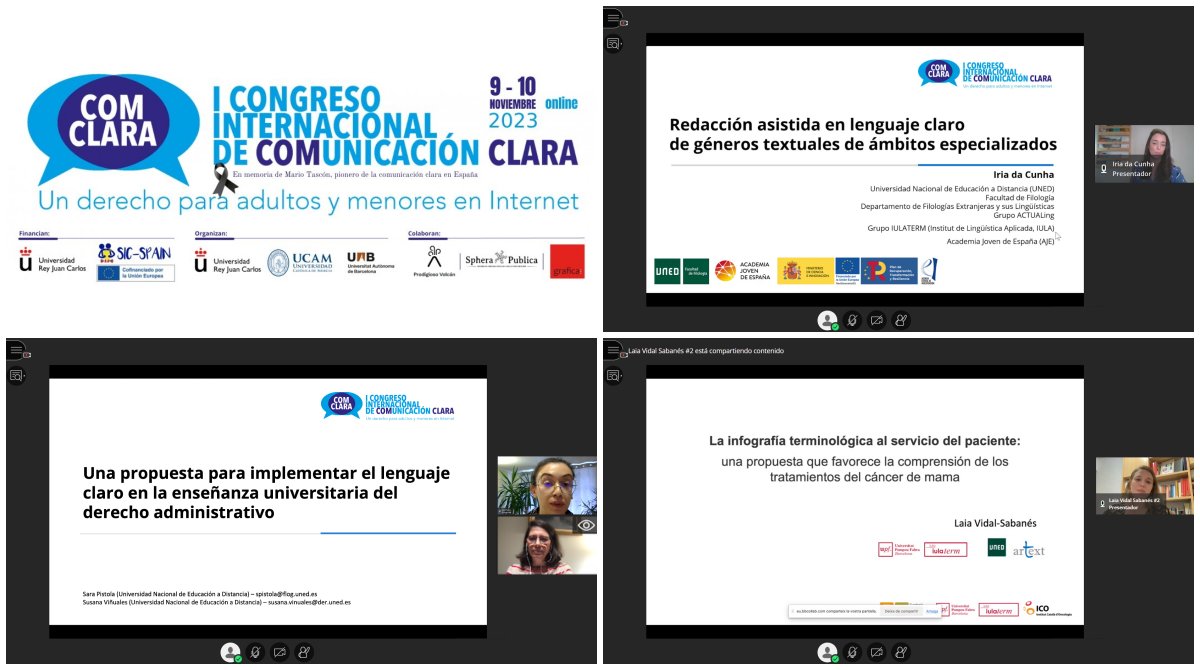
Protocol signed between UNED and semFYC
The UNED and the Sociedad Española de Medicina de Familia y Comunitaria (semFYC) have signed this morning, at the semFYC headquarters in Barcelona, a General Protocol of Action that will help to advance in the development of the sistema arText in the field of medicine.
The event was attended by:
- Dr. Remedios Martín, president of the semFYC.
- Dr. Rosa María Martín, Vicerrectora de Investigación at the UNED.
- Dr. Iria da Cunha, director of the arText team.
- Dr. Laia Vidal Sabanés, Margarita Salas postdoctoral researcher and member of the arText research team.
Both semFYC and UNED have published this news : semFYC press release / UNED press release.
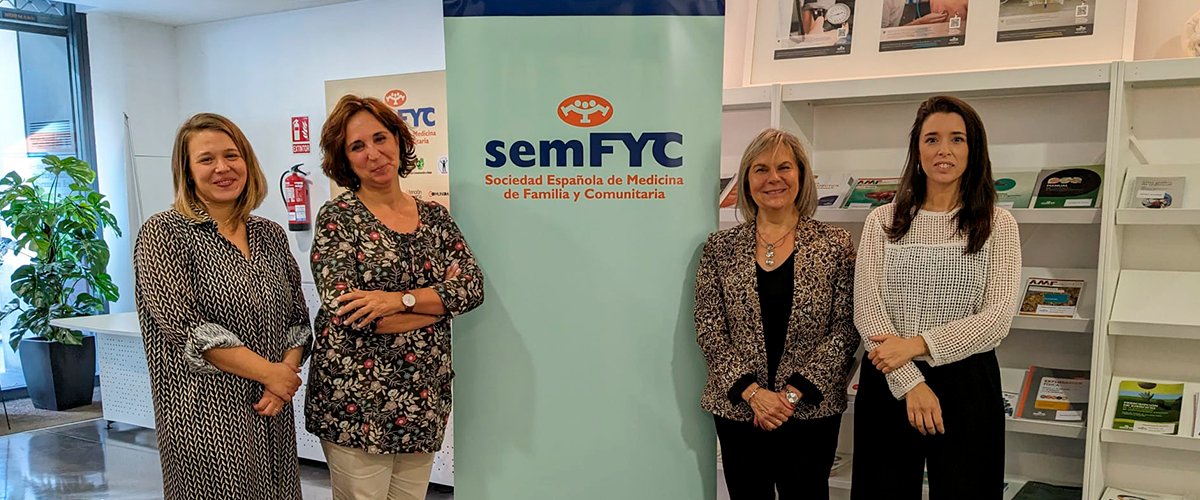
Paulina Yepes is invited to the arText team seminar
Paulina Yepes (Universidad EAFIT de Medellín) has given the third arText team research seminar as an external guest. In this seminar, entitled “El lenguaje claro desde la mirada del comprensor”, she explained the work she carried out in her doctoral thesis on plain language and eye tracking.
Sara Pistola gives a seminar at Pontificia Universidad Católica de Valparaíso
Yesterday Sara Pistola gave the seminar “Hacia la escritura de textos jurídicos-administrativos más claros mediante el uso de la tecnología” at the Propedéutico program of the Facultad y Escuela de Derecho de la Pontificia Universidad Católica de Valparaíso (PUCV). The seminar was organized by Carlos Figueroa, A. Paola Duarte and Jadranka Gladic.
Thank you for the invitation!
Second arText team seminar (2023-2024)
In the second session of the pre- and post-doctoral seminar of the arText team, we invited two external specialists, who talked about the work in clear communication in the field of administration that is carried out in the Generalitat de Catalunya:
- Esther Peña de las Heras, Subdirectora general d’Atenció Ciutadana de la Direcció General de Serveis Digitals i Experiència Ciutadana de la Generalitat de Catalunya, talked about the “Estrategia de implantación de la comunicación clara en la Administració de la Generalitat de Catalunya”.
- Irema Ferrez Vega, Responsable de tramitació entenedora de la Direcció General d’Administració Digital de la Generalitat de Catalunya, presented “Tramitación clara, una metodologia para mejorar los documentos administrativos”.
Thanks a lot for accepting our invitation! 🙂
New project of the arText team: EUPlainTech
The arText team will continue working on plain language and natural language processing thanks to the new Generación de Conocimiento project granted by the Ministerio de Ciencia, Innovación e Universidades. The project is entitled “Plain language and natural language processing in legal-administrative texts in English: the European Commission as a case study (EUPlainTech)”.
Consult the resolution here.
UNED has become a member of the Red Panhispánica de Lenguaje Claro
The Universidad Nacional de Educación a Distancia (UNED) has become a member of the Red Panhispánica de Lenguaje Claro (Pan-Hispanic Plain Language Network), promoted by the Real Academia Española (RAE). On the occasion of this initiative, Iria da Cunha, director of the arText team at UNED, met with Santiago Muñoz Machado, director of this network, to discuss the projects on plain language and artificial intelligence that are being carried out by the arText team.
Inauguration of the arText team research seminar for the 2023/24 academic year
Yesterday we inaugurated the pre- and postdoctoral seminar of the arText team. This first seminar was given by Sabela Fernández-Silva, postdoctoral researcher María Zambrano at UNED. Sabela spoke to us about the “Ethical procedures for research with people at UNED”, with the aim of ensuring that the different studies comply with the rules of ethics and data protection.
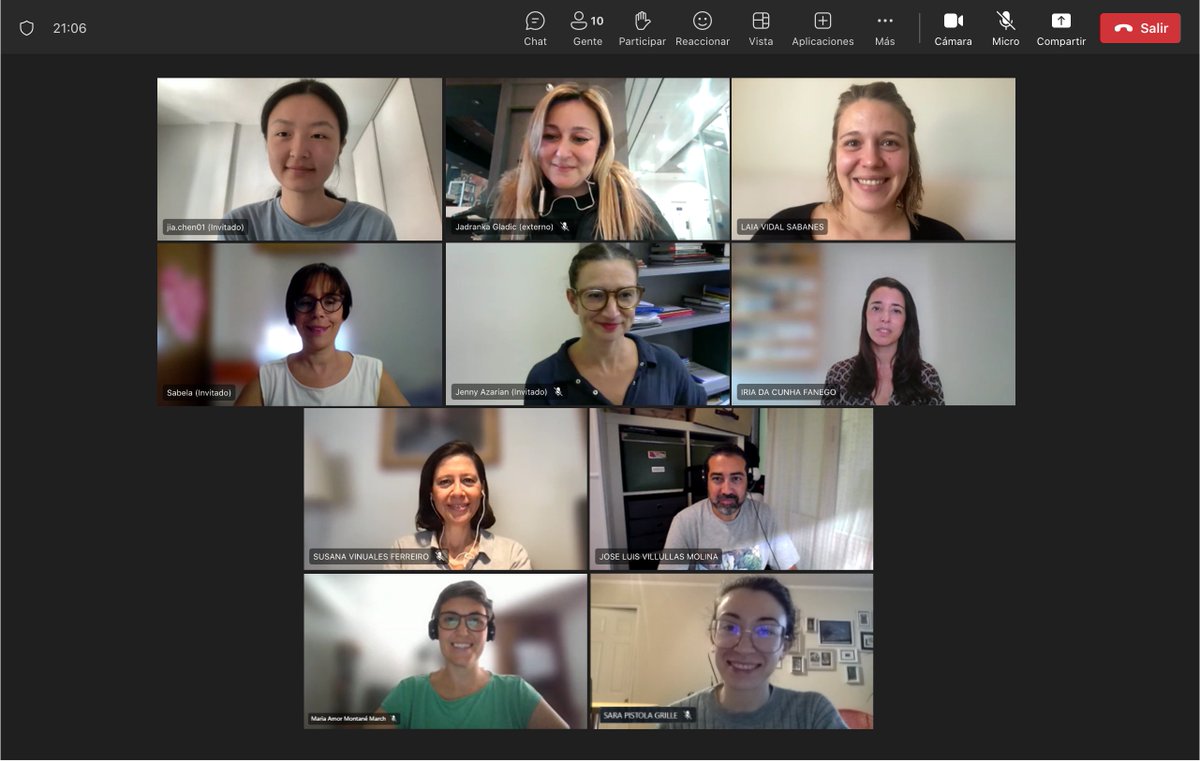
We participate in PLAIN 2023
Iria da Cunha presented the sistema arText at the PLAIN 2023 International Conference, which this year took place at the Law School of the University of Buenos Aires (UBA) on September 27, 28 and 29 and it was organized by the Observatorio de Lenguaje Claro of the Law School at the UBA and the Plain Language Association International (PLAIN). Specifically, Iria participated, along with other specialists, in the panel “Artificial intelligence as a tool to clarify language” and her presentation was entitled “Assisted writing in plain language using natural language processing techniques: the arText system”. The full conference program can be read here.
arText team at CIT2023
Yesterday, Sara Pistola and Iria da Cunha participated in the Working Group on Plain Language at the VIII International Congress on Transparency and Open Government (CIT2023), which took place in Alcalá de Henares. Sara Pistola presented the paper entitled “Los textos que la Administración dirige a la ciudadanía: el caso del Ayuntamiento de Madrid”, which is part of the arText_IMPACT project. You can read the summary of the paper here.
Publication “Lingüistas de hoy. Profesiones para el siglo XXI”
Iria da Cunha has participated in the book Lingüistas de hoy. Profesiones para el siglo XXI, coordinated by Dr. Sheila Queralt and published by Editorial Síntesis. In this publication, 36 linguists talk about their specialty and highlight the available professional opportunities. One of these disciplines is computational linguistics, which Iria da Cunha explains and exemplifies with the creation of the sistema arText. You can see the table of contents and read a sample chapter of the book here.
New publication in Íkala journal
A new issue of Íkala journal has just been published, in which Sara Pistola and Iria da Cunha identify the most frequent and difficult administrative texts to write for the staff of the Ayuntamiento de Madrid (Madrid City Council) and Facultad de Derecho (Law School) at UNED. The article can be read here.
The reference of the article is:
Pistola, Sara y Da Cunha, Iria. (2023). Escritura de géneros textuales administrativos en el contexto académico y profesional español. Íkala, Revista De Lenguaje Y Cultura, 28(3), 1–30. https://doi.org/10.17533/udea.ikala.348531.
New member of the arText team
Josep Villullas has joined the arText team (Departamento de Filologías Extranjeras y sus Lingüísticas at UNED) to work as a computer scientist and technologist in the arText_IMPACT “Prueba de Concepto” project (2022-2024), directed by Dr. Iria da Cunha and funded by the Spanish Ministry of Science and Innovation
The sistema arText in the eScience data repository of Consorcio Madroño
A new space on the sistema arText has been launched in the eScience data repository of the Consorcio Madroño. In this space you can find results of the TIC-eADMIN and arText_IMPACT projects which, at the same time, are part of the results of Sara Pistola’s doctoral thesis in progress, supervised by Dr. Iria da Cunha and Dr. Susana Viñuales.
The bibliographic references of the publications currently available are:
- Sara Pistola Grille; Iria Da Cunha Fanego; Susana Viñuales Ferreiro, 2023, “Fichas con información lingüística sobre 5 géneros textuales del ámbito de la Administración”, https://doi.org/10.21950/ZHXH9G, e-cienciaDatos, V1
- Sara Pistola Grille; Iria Da Cunha Fanego; Susana Viñuales Ferreiro, 2023, “Materiales para la evaluación de arText por parte de estudiantes universitarios de derecho”, https://doi.org/10.21950/V45AMM, e-cienciaDatos, V1
- Sara Pistola Grille; Iria Da Cunha Fanego; Susana Viñuales Ferreiro, 2023, “Adaptación a lenguaje claro de fraseología administrativa”, https://doi.org/10.21950/ZF2KRC, e-cienciaDatos, V1
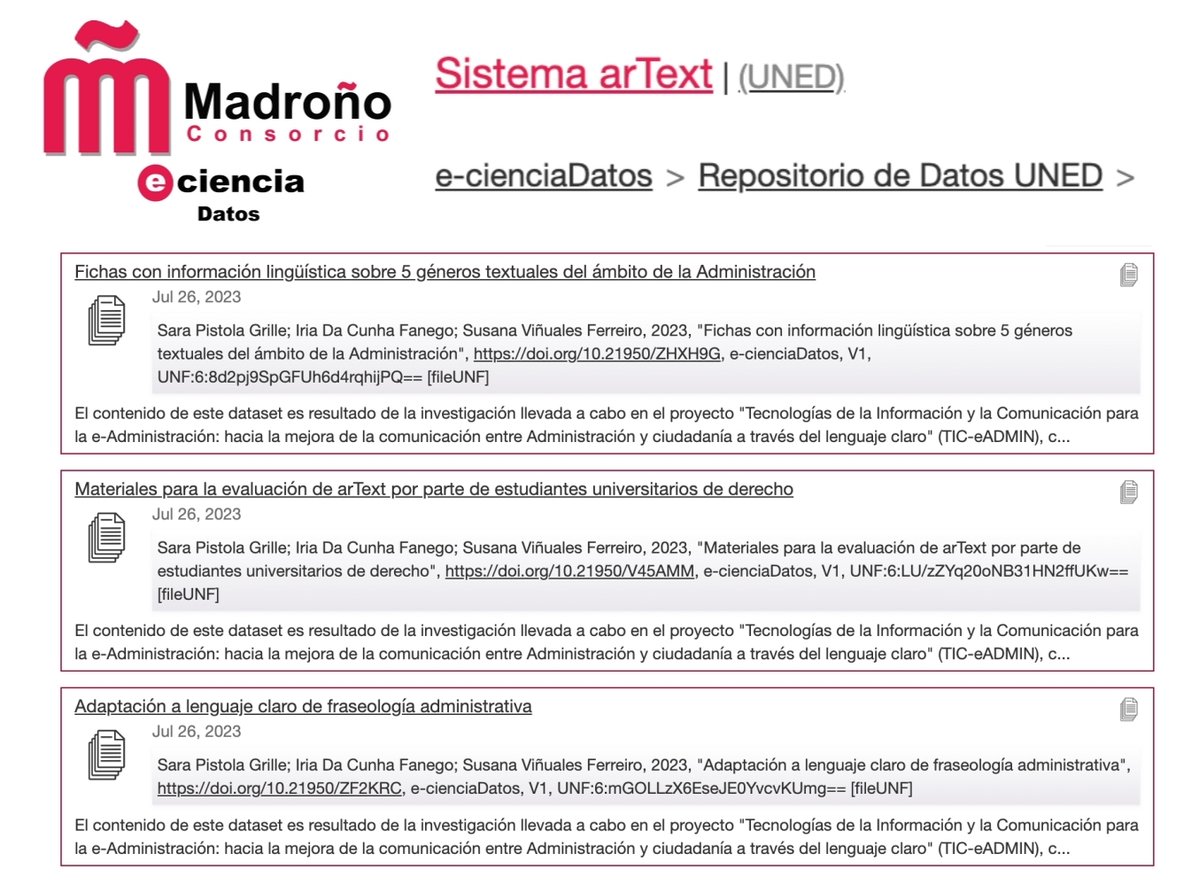
Iria da Cunha talks about arText claro at UNAM
On August 17, Iria da Cunha gave a conference on arText claro at the Instituto de Ingeniería at Universidad Nacional Autónoma de México (UNAM) as part of the internal seminars of the Grupo de Ingeniería Lingüística. The conference, entitled “The arText claro system: from research to transfer and dissemination”, can be viewed at this link.
Iria da Cunha, a woman of reference in the ICT field
Iria da Cunha appears in the 2023 edition of the INNOVADORASTIC Mujeres referentes del Siglo XXI (Women of the 21st Century) publication as the creator of the sistema arText. This program aims to make visible stories of women of the 21st century who stand out for their work in the field of science and technology. You can find the interview with Iria on pages 88-95 of the publication, which can be downloaded through this link.
Review of our book “Lenguaje claro y tecnología en la Administración”
A review of our book “Lenguaje claro y tecnología en la Administración” (Iria da Cunha, Ed. 2022, Editorial Comares) has been published in issue 178 of the Punto y Coma bulletin of the European Union. The author of the review is Leire Segura (European Commission) and it is available here (p. 15-22). 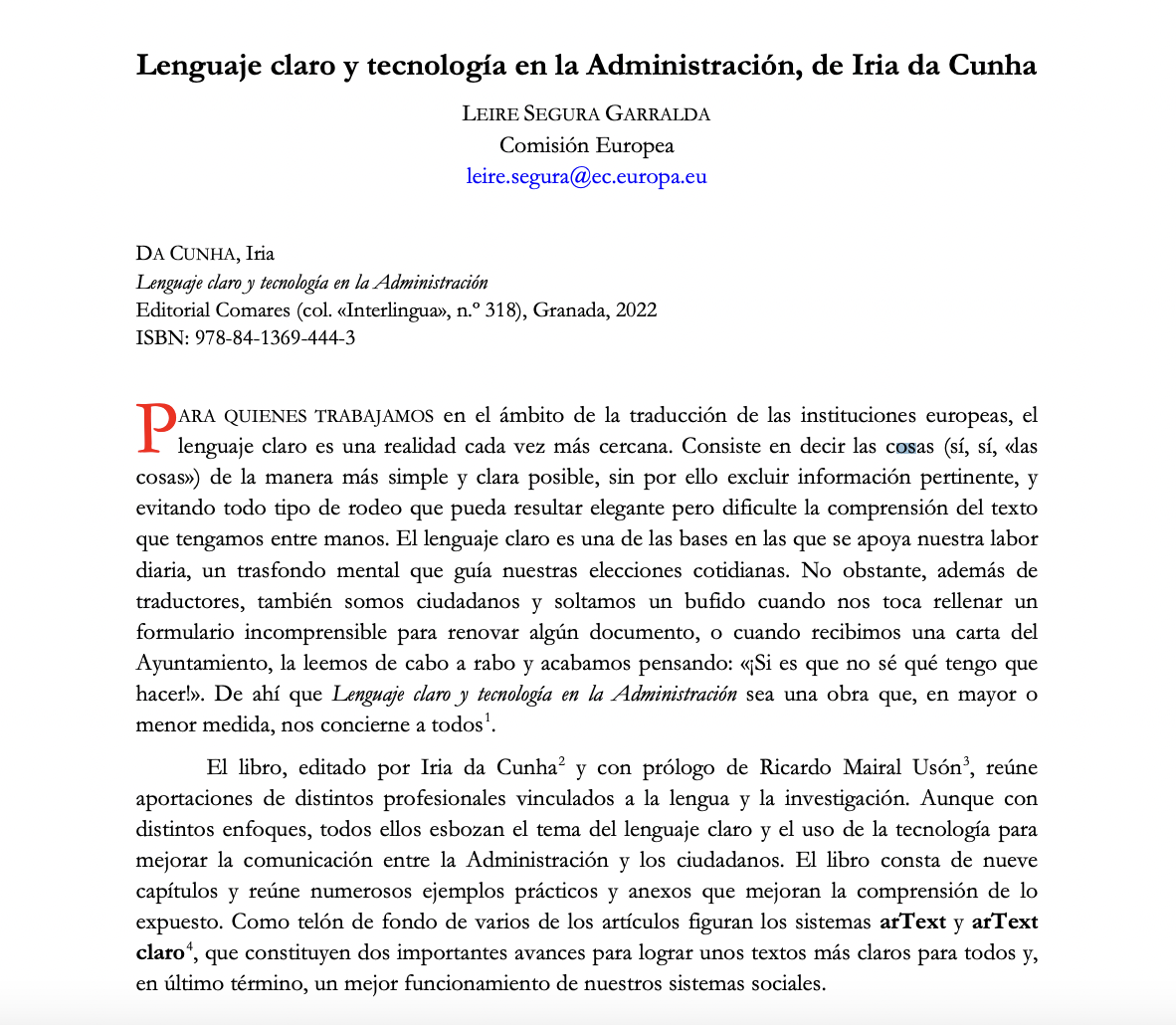
ArText team research seminar by Jenny Azarian
Yesterday, Jenny Azarian, member of the arText team and student of the PhD program in Philology at UNED, gave a seminar entitled “Evaluation of the impact of the use of arText claro on the comprehension and perception of clarity of texts by vulnerable groups” as part of the pre- and post-doctoral seminars of the arText team. In this forum, Jenny Azarian contextualized her research, which is part of the arText_IMPACT project, and presented the objectives, methodology and ongoing work she is carrying out.
M. Ángeles Escobar participate in the 5th Eduling Biannual Meeting
M. Ángeles Escobar, lecturer of the Departamento de Filologías Extranjeras y sus Lingüísticas at UNED and member of the arText team, participated in the 5th Eduling Biannual Meeting: “Grammar teaching and Learning: challenges and opportunities”, which was held last week at the Universidad Autónoma de Barcelona. The work presented was entitled “A Case Study of Connectors in ESP though a RST grammar as implemented in arText” and you can read the abstract here.
Laia Vidal-Sabanés presents at the arText team’s research seminar
Laia Vidal-Sabanés, postdoctoral researcher Margarita Salas UPF-UNED of the arText team, gave yesterday the seminar “Towards the incorporation of medical plain language in arText claro”, in the framework of the pre- and postdoctoral research seminars of the arText team. Laia Vidal-Sabanés presented the objectives, the methodology and the first advances of her postdoctoral project, which aims to incorporate the medical field in arText claro.
Susana Viñuales participates in the Ciclo “Lenguaje Claro en Español”
Susana Viñuales, member of the arText team, has participated in the Ciclo “Lenguaje Claro en Español”, organized by the IFPyGP and the Secretaría Legal y Técnica del Gobierno de la Ciudad Autónoma de Buenos Aires. This cycle of seminars consists of 11 meetings in which specialists in the plain language field present a topic related to this subject. Susana participated in the third meeting, entitled “Plain Language and Artificial Intelligence. The arText experience“, which was attended by more than 180 people.
Iria da Cunha and the sistema arText are in the news in “El País”
Elena Sevillano’s article published in the newspaper El País highlights the resurgence of Humanities degrees, which are increasingly allied with other disciplines such as, for example, Computer Science. As an example of this synergy, in the article, the author dedicates a space to talk about Iria da Cunha and her work as a computational linguist, as well as the arText project that she coordinates, pioneer in our country.
You can read the full article at this link.
Use of arText system to write sentences
Dr. José Osvaldo Ledesma, Justice of the Peace of Berón de Astrada, has been using artificial intelligence (AI), specifically the sistema arText, for a year to ensure clear writing in the drafting of his sentences. This news has been highlighted in several media: Diario Época, Misiones Online, News ES Euro, Radio Dos, Errepar + and Economis.
Participation of the arText team at the INNDOC2023 Conference
Several members of the arText team participated in the 3rd International Conference on Innovation in Teaching and Research in the Social and Legal Sciences (INNDOC2023), which took place on July 8 and 9 in virtual format.
On the one hand, Sara Pistola and Susana Viñueales have presented the communication “Use of an assisted editor for writing administrative texts: a proposal for the preparation of the Final Degree Project (TFG)”. In this work, Sara and Susana have presented a TFG proposal that incorporates a writing administrative texts task using the sistema arText. You can read the abstract and watch the presentation in this link.
On the other hand, Jadranka Gladic and Iria da Cunha presented the communication “A characterization of the Law Degree in Spanish and Chilean universities”. In this study, Jadranka and Iria make a contrastive analysis on the number of Final Degree Projects in the field of Law that exist in the two countries mentioned and the sub-themes they deal with. You can read the summary of the paper and retrieve the presentation in this link.
Sara Pistola participates in the III Jornadas de Corrección de Textos en Español
Sara Pistola, member of the arText team and student of the PhD program in Philology at UNED, presented the sistema arText at the III Jornadas de Corrección de Textos en Español (IIIJCTE), organized by the Universidad del Salvador and held virtually on June 1st and 2nd. Sara’s presentation was entitled “The arText system as a tool for writing texts in specialized fields and in clear language” and you can watch it in the following video:
Jadranka Gladic gives the 4th arText seminar
Yesterday, Jadranka Gladic, lecturer at the Pontífica Universidad Católica de Valparaiso, student of the PhD program in Philology at UNED since 2021 and member of the arText team, gave, as part of the pre- and post-doctoral seminars of the arText team, the seminar entitled “The Final Degree Project in Administrative Law: a comparative analysis between Spain and Chile”. Jadranka Gladic presented the objectives, methodology and first results of her doctoral thesis, supervised by Dr. Iria da Cunha.
Update of the urtext dissemination brochure
We have updated the dissemination brochure to promote sistema arText. You can find it in a bilingual version (Spanish-English).
arText claro at Clear Writing for Europe 2023
Iria da Cunha, director of the arText team, presented arText claro at the Clear Writing for Europe 2023 conference. In this edition, the conference was about “Supporting European democracy and transparency through clear language”, with the aim of discussing how public administrations and the European Union can communicate in a clearer way when writing texts addressed to citizens. Iria participated in the Workshop “Drafting and editing tools and resources” together with Stéphanie Guillaume, with the presentation “arText claro: A writing Assistant to draft Spanish administrative texts in plain language”. The conference was attended by more than 1200 people.
A collaboration agreement signed by the UNED and the Academia Joven de España
The UNED and the Academia Joven de España (AJE) have signed a collaboration agreement with the aim of promoting scientific dissemination. Specifically, research work, studies, publications and dissemination of results on topics of common interest will be carried out. The rector of the university, Ricardo Mairal; the president of the Academia Joven de España, Javier García Martínez; the vice-rector for Research, Knowledge Transfer and Scientific Dissemination of the UNED,Rosa María Martín Aranda, and the UNED professors and members of the AJE, Iria da Cunha Fanego, director of the arText team, and Borja Franco Llopis, will participate in the events to be held on the occasion of the agreement.
Lecture by Jia Chen at the VIII Jornadas de Doctorado en Educación of the UAM
Jia Chen, member of the arText team and student of the PhD program in Education at the Universidad Autónoma de Madrid (UAM), presented the progress of her doctoral thesis, supervised by Dr. Iria da Cunha (UNED) and Dr. Juan Antonio Núñez (UAM), at the VIII Jornadas de Doctorado en Educación de la UAM. The conference took place on May 18 and 19 at the Facultad de Formación de Profesorado y Educación of the UAM. The seminar given by Jia Chen was entitled “The use of arText in teaching Spanish as a foreign language to Chinese students: advances in the study”.
Participation in the IV edition of Un Mundo de Fusión Digital
Iria da Cunha participated in the IV edition of Un Mundo de Fusión Digital, which took place yesterday at the headquarters of the Escuelas Pías in UNED Madrid. This event aimed to open a dialogue between humanities and technology through various conversations between professionals from different fields. Iria da Cunha participated in the space dedicated to artificial intelligence (AI) along with other specialists. She explained the importance of the sistema arText in the current context and highlighted the importance of interdisciplinary work to achieve integrative and respectful projects in the fields of AI, humanities and technology. The full program is available here and a photo gallery of the event can be viewed here.
arText_IMPACT in the II Jornadas Online de Proyectos de Investigación I+D+i
Iria da Cunha and Juan Antonio Núñez Cortés participated in the II Jornadas Online de Proyectos de Investigación I+D+i held by the Departamento de Filologías Extranjeras y sus Lingüísticas at UNED. The conference, presented by M. Dolores Castrillo, Department’s director, included four competitive research projects that are currently underway and concluded with a round table on good practices in the implementation of R&D+i projects. Iria da Cunha presented the project “Un prototipo tecnológico para la redacción en lenguaje claro: incorporación en la Administración pública y análisis de su impacto en la ciudadanía“ (arText_IMPACT). Also, Juan Antonio Núñez talked about one of the studies being carried out in the framework of arText_IMPACT: “Comprensión lectora, percepción de claridad y herramientas digitales“. You can retrieve all the presentations of the conference at this link and, also, you can see the talks concerning the sistema arText below:
New addition to the arText team
Jenny Azarian has joined the arText team in the framework of the arText_IMPACT project, funded by the 2022 call for “Prueba de Concepto” projects of the Spanish Ministry of Science and Innovation (2022-2024).
In addition, Jenny is currently carrying out a PhD in the Doctoral Program in Philology at UNED. The topic of her thesis is related to the evaluation of the impact of the use of arText claro on the comprehension and the perceived clarity of texts by vulnerable groups.
Cyberseminar TREMÉDICA by Iria da Cunha
Iria da Cunha, director of the arText team and lecturer at the Departamento de Filologías Extranjeras y sus Lingüísticas from the Facultad de Filología at UNED, has given the TREMÉDICA cyberseminar entitled “Herramientas y recursos de tecnología lingüística para la medicina” (Language technology tools and resources for medicine). In the course, Iria showed several language technology tools and resources that can be useful for humanistic profiles and health professionals.One of these tools is the arText system, which helps to write texts from different specialized fields, including medicine.
Sara Pistola gave the 2nd arText seminar
Yesterday, Sara Pistola, member of the arText team and student of the PhD program in Philology at UNED, gave a seminar entitled “Teaching Administrative Law through its textual genres” as part of the pre and post-doctoral seminars of the arText team. In this forum, Sara Pistola contextualized her research and presented the objectives, methodology and preliminary results of her doctoral thesis.
arText team participation in AESLA 2023
M. Ángeles Escobar and Eva Samaniego, members of the arText team and professors at the Departamento de Filologías Extranjeras y sus Lingüísticas from the Facultad de Filología in UNED, participated in the 40th International Conference of the Spanish Association of Applied Linguistics (AESLA 2023). The conference was held in Mérida on April 26-28. The paper presented by M. Ángeles and Eva is entitled “An English-Spanish contrastive analysis of the recommendations on plain language in the legal-administrative field” and is part of the TIC-eADMIN project.
arText now has 200,000 users!
The arText system has reached 200,000 users. Thank you very much to those of you who make it possible for our project to continue to grow from Spain, Mexico, Chile…🎉
Opening of the biweekly research seminar
Yesterday we started with the biweekly research seminar mainly for arText team pre- and post-doctoral researchers. The seminars aim to be a meeting point to share progress, put ideas in common, establish links between the team members, follow up on the various ongoing projects and disseminate areas of scientific interest. In short, these seminars aim to be a collaborative space to highlight plain language and areas of interest in this discipline.
We took part in a conference organized by the Generalitat Valenciana
On March 22 we participated in the conference “Comunicación clara y lenguaje administrativo. Por una administración al servicio de las personas”, organized by the Conselleria de Participació, Transparència, Cooperació i Qualitat Democràtica of the Generalitat Valenciana. Iria da Cunha gave a talk entitled “Herramientas y recursos para la comunicación clara”, in which she presented technological tools related to plain language, such as arText claro.
The recording of the presentation can be viewed here:
Presentation of the book “Lenguaje claro y tecnología en la Administración”
On March 15, the presentation of the book “Lenguaje claro y tecnología en la Administración”, published in the Interlingua Collection of Editorial Comares, was held at the Escuelas Pías location of the UNED (Madrid). This book is the result of the research carried out by the arText team within the framework of two projects financed by the Ministry of Science and Innovation:
- Information and Communication Technologies for the e-Administration: towards the improvement of the communication between Administration and citizenship by means of plain language [TIC-eADMIN] (PGC2018-099694-A-I00)
- A technological prototype for writing in plain language: incorporation in public administration and analysis of its impact on citizens (arText_IMPACT) (PDC2022-133935-I00)
The recording of the presentation can be viewed on YouTube:
Talk in the LAAAB of the Gobierno de Aragón
On January 18th we were in Zaragoza, in the Workshop on Comunicación clara para unidades de Transparencia organized by the Laboratorio de Aragón [Gobierno] Abierto (LAAAB). The workshop brought together several specialists to talk about transparency and clear communication. In addition, we had the opportunity to show the attendees the possibilities offered by arText claro to write administrative texts addressed to citizens in a simpler language.
TFM using arText
Carlos José Blandón Ruiz has defended his TFM entitled “ArText como recurso didáctico para la redacción de textos expositivos” at the Universidad Panamericana de Nicaragua. In his work, he has used arText as a didactic resource to develop the writing skills of a group of high school students. The director of the TFM was Dr. Margarita Míxter Moreno.
Thank you, Carlos, for bringing arText to Nicaragua and for exploring new applications of the system!
Video about the UNED
Iria da Cunha, coordinator of arText, has participated in a video of the Ministry of Finance and Civil Service to explain the academic and scientific work carried out at the Universidad Nacional de Educación a Distancia (UNED). In the video, he also talks about the arText system, which is currently being developed in the Departamento de Filologías Extranjeras y sus Lingüísticas of that university.
You can watch the video here:
arText_IMPACT: new funded project to develop arText
On December 21, 2022, the final resolution by which the Spanish Ministry of Science and Innovation awarded the grants for “Prueba de concepto” 2022 projects was published. Our project “A technological prototype for writing in plain language: incorporation in public administration and analysis of its impact on citizens” (arText_IMPACT) has been one of those selected. It will last 2 years and to carry it out we have obtained a funding of 109,250 euros. Let’s go for it!
New book on plain language and technology
We are very happy to announce the publication of the book entitled “Lenguaje claro y tecnología en la Administración”, edited by Iria da Cunha and with the participation of several members of the arText team as authors of the different chapters. The prologue is written by Ricardo Mairal, rector of the UNED. The book is published in the Interlingua collection of Editorial Comares and includes part of the research carried out in the context of the TIC-eADMIN project, one of the projects through which arText has been developed in recent years.
You can obtain more information about the book at the following link: https://www.comares.com/libro/lenguaje-claro-y-tecnologia-en-la-administracion_145665/
New addition to the team
Recently, the Ministry of Universities has awarded a María Zambrano grant for the attraction of international talent to Sabela Fernández Silva, assistant professor at the Instituto de Literatura y Ciencias del Lenguaje of the Pontificia Universidad Católica de Valparaíso. On January 1st she will join the Departamento de Filologías Extranjeras y sus Lingüísticas of the UNED to work on the development of new functionalities of arText for 2 years.
Congratulations! We are very happy to be able to expand our team.
